#I have a lot more thoughts about this but considering my theme analysis is reaching 5k words I think I can save it for later
Explore tagged Tumblr posts
Text
Ok I have a whole section about this in the ddlc theme analysis that will take months to actually finish but the way the theme of nihilism plays directly into the game’s meta existence as a dating sim parody aughhughhhhh
Like most parody visual novels and parodies in general don’t expect you to get invested in the world it presents. Like who actually cares about the in-depth worldbuilding in the kernel sanders dating sim? Like unironically. Its setting either exists to make fun of the world or subvert it, never actually taking its base concept seriously.
And ddlc is like it too, making all the characters the embodiments of their tropes and having a dozen dumb contrivances to fill its cutesy quota. And the player base before playing the game expects it too, either joining for the hype, the horror, the lore, or the parody. Heck even I was like that, knowing all about the cool scares and meta stuff but none of the actual good writing until literally this year. Like no one told me about it the span of seven years. Apparently it wasn’t a selling point. This game has actual heart in it but from an outside perspective it was just another indie horror genre parody. Nobody came in actually expecting to get attached to the world of cute anime girl game featuring beloved anime tropes such as the tsundere and yandere.
And when Monika has her own epiphany she ends up having a pretty similar view too. A lot of things fuel her apathy and overall disillusionment with her life, but I think a big part of it is the fact that not only are the club members fictional, but they’re also badly written anime tropes. It’s like an insult to be compare to that, and yet here she is having to tolerate her existence being a poorly written joke. Nobody would actually want to care for unrealistic cliches, getting attached to badly written characters means you have bad taste allegedly. Why should she care for these tropes that are supposed to be her “friends”, when they have no meaning and can’t care about someone on a real deep or intimate level. Unlike an actual person, a cliche parody can’t have enough substance to mean something. They don’t feel real. They don’t even feel real emotions. Why would they change your life? Why should they mean something to you?
And being forced to live with npcs lab grown to appeal to the very specific fantasies of a stereotypical anime fan while they involve you in their insignificant shenanigans that mean nothing in the end where they get to enjoy the one thing you want more than anything while not being able to understand how lucky they are compared to you?
…Yeah it kinda sounds like hell. Especially for miss manga hater. And when you’re in hell looking at heaven, why wouldn’t you do anything just to get a closer look?
(Also shoutouts to AM in that one audio drama of ihnmaims specifically)
Uh. Problem with all of this. None of it is actually true with the club. They’re fully fleshed out people with depth and complexity. They are just as sentient as Monika is, and by the end of the game a lot of people cared about these characters, this world that was meant to be a parody ended up meaning the world to people. A world that is meaningless in the grand scheme of things holding value nonetheless. Because even if the world wasn’t made to be cared about, people still cared.
This was all probably intentional btw. Maybe not ddlc being labeled a viral mascot horror, but it did help in a different way. While Dan Salvato mentioned a lot about making this game as anime tropey as possible, he also wanted to tell a good story with good characters. He ended up putting his and others’ real human experience into these characters and making them real, characters who are still supposed be the embodiment of their tropes. It’s clear he love and cares about all of them, and it’s even clearer that the internet loves them just as much. Despite being cliches, they had real impact on people’s lives, teaching people new perspectives, allowing people to grow into something better, etc. By ddlc+, they ended up as characters that grew beyond their tropes and became their own people, something that was a big focus within its art and the side stories.
There’s something so genuine about these games that I never got to see as an outsider looking in, and I feel like a lot of people think about it the same way. The same way as Monika. The way that goes against the whole point of the secret ending. Even if they were a parody, the world still loved them. Even if they’re a bunch of ai in an existential science experiment, they could still love and care for each other. Even if they aren’t real. Even if nothing else is real. Even if their existence is meaningless. They can still love each other and find meaning in that.
And I think this meta narrative is just really sweet man. The game still ends with everyone in a bad situation, but that little spot of hope means a somewhat happy ending wouldn’t be antithetical to the game’s themes like other games with sad endings. Because even if the world goes against it and everything else sucks, they can still be happy, together. They deserve it. It’s ok to want them to be happy. There’s the chance for something better
Ok that’s it Ddlc is cool idc if it sounds cheesy I like it
#doki doki literature club#ddlc#yay I love meta narratives Charlie I LOVE META NARRATIVES#idk the impact and value of art and fiction even if it isn’t real and aaugh#idk if this post is too optimistic for this game but man what if I want to imagine Sisyphus happy#no idea if any future ddlc projects will give them a somewhat happy ending but seeing the way the characters are talked about I don’t think#it will be overly cruel#anyways this post was just me trying to summarize that one section of the theme analysis but it might have made that section longer oops#I have a lot more thoughts about this but considering my theme analysis is reaching 5k words I think I can save it for later#I’ll save you my yapping for another day🫡#tempestmothtalk#analysis
2 notes
·
View notes
Note
i'm so curious about your character gender reads now tho 👀👀
(You enter the kitchen and see me, eating shredded cheese out of the fridge by the handful)

(I turn around to face you.)
Hi. Do you want me to sell you on amab NB Siffrin? I'm going to try and sell you on amab NB Siffrin. And maybe even a little bit of tranfem siffrin and/or loop. as a treat. just for you.
So, (I put the cheese back in the fridge.)
This read of mine comes from a number of things, a lot of them to do with the game's themes, and to do with Siffrin being a narrative foil to the other characters. And Vaugarde as a whole.
(READMORE WARNING: THIS IS LIKE 6K WORDS LONG. YOU ALL SHOULD KNOW BY NOW I DON'T MAKE POSTS WITHOUT UNCONSCIOUNABLE AMOUNTS OF EVIDENCE AND EXPLANATION. IF ANYTHING I'M BEING RESTRAINED HERE. THUMBS UP.)
(Pre-readmore note: this is in response to me having given an analysis of how I personally percieve Sifloop in relation to asexuality and shipping. Which you can look at here. (x))
It is however, not what my like, no-holds-barred no-rules just-for-me headcanon for Siffrin would be. (which is intersex 'head empty no thoughts' siffrin, for the record). This is instead my close-reading-of-the-text-and-themes interpretation of Siffrin. This is why I'm gonna be saying Read and not Headcanon, to distinguish the two. (Anything I consider a little bit too much of a stretch vis a vis interpretive hard reads I will call a headcanon. But those are for the last bit of this post.)
Unlike *gestures at mass media* All That… ISAT is already packed to the gills with queer rep, to the point where I feel no need to grasp at straws and make overextended reaches into obviously unintended subtext. Like with, y'know, most media. Since here, the subtext isn't unintended. Like this isn't a Transfem Metal Sonic or Aroace Ash Ketchum situation where I know none of the evidence is on purpose and I'm just having fun making a conspiracy theory pinboard out of it. This is like… There's intentionality there. And I want to engage with it on its level, see what the text itself suggests. It's my personal preferred method of expressing deep respect to a text. (Not that it has to be anyone else's, obviously. This is just my way of showing I love a work.)
So yeah, I am, in general, very interested in hearing hard-fought arguments when it comes to interpreting texts. I'm glad ISAT has a lot to pick at here, and so, I will. (and since not a lot of texts ever have anywhere near this kind of depth in this arena, i don't wanna squander it… i'll try and keep my own biases as in check as i can, and already have done by hashing quite a bit of this interpretation out with two people of very different gender identities to mine. To put it mildly, binary-aligned or transfem I am very squarely Not.)
(Now that the cheese bag has been removed from the equation, I drop this framing device, sit you down at the table and begin to dredge up evidence from below it.)
Okay, so. What are my like… Core reasonings here? I think I can split it into three categories. Broadly, with an amount of overlap, so bear with me…
SIFFRIN AS A FOIL AND CONTRAST TO MIRABELLE, ISABEAU AND THE CHANGE RELIGION AS A WHOLE.
SIFFRIN'S HABITS OF CLINGING TO 'KNOWN QUANTITIES', SCAPEGOATS, AND THEMES OF RACIAL IDENTITY INTERSECTING WITH GENDER IDENTITY.
SIFFRIN, LOOP, DE-PERSONING, DEHUMANISING, APATHY AND SURVIVAL.
Okay so up top I'm going to split my argument for Siffrin's gender identity Present and Future here. This means, for now, I'm arguing for AMAB NB Siffrin alone. The transfem stuff is for later (and more for loop, in my mind, too).
I have a few direct observations of the text here that set things up. Here are the things in-game that make me assume that Siffrin, as of the start of the game, has not yet undergone any radical change to their identity in their life. Not on purpose, at least. These are ordered in a messy but logical flow, so uh, try and keep up. I'll synthesise at the end. I Prommy.
SIFFRIN AS A FOIL AND CONTRAST TO MIRABELLE, ISABEAU AND THE CHANGE RELIGION AS A WHOLE.
CHANGE & THE UNIVERSE: PERCEIVED OPPOSITES
When interacting with most objects in the Changing Room in the house, they express a genuine curiosity toward body craft. It seems they are legitimately unfamiliar with it on a deeper level than having simply heard of it.
Despite this curiosity (explicitly stating they've previously wondered about it), they dismiss it as too much work early on in the game. These points combined seem to suggest to me that they have never previously sought out any kind of real change to their appearance or identity. Either for gender reasons, or other body dysmorphia reasons. (Which, despite the dismissal, they do refer to their body as a 'meat prison', which is not particularly positive) However...
This changes in Act 3. In acts 3 and 4 they flatly state: "You're thinking about crafting your body. You seem to have all the time in the world now." While still never spoken aloud, their declining mental state corrosponds with a worn-down, almost nihilistic reckoning with the feelings they masked with the 'meat prison' joke in act 2.

[Image: Interactions with the change craft textbook in acts 2 and 3/4.]
In talking to Mirabelle, they are very self assured that one can stay the same/be comfortable with their born identity. They also seem a little unsettled by the change religion's flippancy in general, which makes sense, as they have been clinging to the famliar (even when painful) to cope with other traumas. (More on this later, section 2)
The Universe Faith appears to heavily disincentivise Wanting for oneself and other expressions of Free Will due to safeguarding against Wish craft. This seems to have impacted Siffrin's mental state majorly, even if they do not recognise it. The followers of the faith are (if Siffrin is to be believed) incentivised to 'go with the flow' and take paths of least resistance, and those that DO make big decisions will tend to justify things as being The Universe's Will. (See: The King's entire Modus Operandi, and the way Loop (and Siffrin) do the same rote actions, constructing worldviews (the play analogy, the Universe's Will) and justify that as what the Universe Would Want (despite a total lack of evidence to prove as such)) As such, it seems as if a follower of this faith as neurotic as Siffrin would be unlikely to act upon any Wants to Change Themselves without a lot of turmoil and backwards-justification. (Of note, Loop's forcible change coinciding with a dropping of pronoun. But that is again for later, section 3) As of the start of the game, they do not appear to have broached this kind of turmoil directly.

[Image: Act 5 interaction with the star journal, emphasis on it being a cautionary tale against reckless usage of wish craft, instilled so deeply to be a children's bedtime story]
Siffrin, in act 5, grows frustrated with both The Universe and The Change God, feeling abandoned by the former. They struggle with simultaneously anthropomorphising the Universe as a cruel onlooker, while also seemingly acknowledging them as a cold, almost scientific fact of nature. This would heavily imply that the 'blame' put upon the Universe by Siffrin in these moments is known to them, at least a little, to be potentially meaningless. It seems that somewhere in Siffrin's belief system is something, be it the core or merely a creeping worry, that the Universe is not a thinking, feeling, thing. And thus that their invocations of "The Universe's Will" are merely rationalisations of random chance and consequence. This is in DIRECT contrast to the Change God, proven to be an emotive sapient entity, who merely refuses to offer a helping hand. (Similar sentiments are, too, spoken by the Change God itself.)


[Images: Interacting with the window in the observatory in act 5, text from the change god meeting]
So. These are the bulk of my observations when it comes to how Siffrin is positioned in contrast to the Change Belief. It would seem to be that Siffrin, inkeeping with their role as an outsider, is a complete fish out of water in Vaugarde's change-centric world. This makes sense! It makes them a compelling foil to the Vaugardians in our cast, and allows the Vaugardians to challenge Siffrin's worldviews merely by existing. It also, more importantly, makes Siffrin an interesting lens through which to inspect our two most Change-driven characters. Mirabelle and Isabeau.
MIRABELLE.
Mirabelle and Siffrin's differing faiths are put on display the most frequently. Interactions like the circle key and the party's disbelief of Siffrin's facts about the stars make this clear. These interactions other Siffrin from the group further, and are another avenue through which Siffrin can ignore their own needs, not communicating with the party and allowing them to dismiss things he deems important.
Obviously, the friendquest is primarily about Mirabelle's struggle with her aromanticism and asexuality. But there's an implicit undercurrent of gender there too. Mirabelle has never made a big change, not like Isabeau. She has never 'changed completely', by her words. And Siffrin distinctly finds this an odd thing to be worried by. Whatever culture he carries has no pressure to explore these avenues, it seems. Siffrin is able to help her by sharing their honest opinions, that he's never felt the need to change these things, and he's happy (allegedly). Why should she?

[Image: Mirabelle's friendquest text] Siffrin is not thinking particularly hard when he first does the friendquests, they are just being themselves. By positioning Siffrin as this unchanged yet confident object, they are in the perfect position to help Mirabelle by being in her almost exact position, both sexuality and transgender status (albeit, with the caveats of potential alloromanticism, and a they pronoun), that they become her ideal foil. (And in fact, the subtle differences between their positions in canon add to this, showing a display of Perceived Genuine Truth, rather than simple in-group camaraderie)
Whereas…
ISABEAU.
When Mal du pays speaks as Isabeau, it says the following;

"I don't want to know someone who won't even try to change, who luxuriates in things staying the exact same like you do."
I don't want to know someone - Shame of being known, that's Isabeau's insecurity. Reflected back at Siffrin, who has become the worst thing imaginable to each of their friends, in Siffrin's own mind. He absorbs their insecurities like a sponge and incorporates them into himself. Empathy turned ill.
Who luxuriates in things staying the exact same - Now THAT'S interesting. This is not Isabeau's insecurity, it's Siffrin's own. But also, it appears as if, Siffrin, whom to Mirabelle was unflappable in that not changing was alright, has internalised some of her worry. That it is MDP's Isabeau saying this, though, shows this is about Personal Change, perhaps even Specifically Gender and Self Image, rather than Mirabelle's spiritual side.
Isabeau and his distinct change in personality and gender, to become someone who he actually likes… Diametric to Siffrin, who has been stagnant for a long time, presumably as far as they can remember. It would seem to imply they have no recourse against this argument. Siffin becomes, in his mind, the opposite to Isabeau, a man he deeply admires the bravery of when told the story of his Change. These are Siffrin's words against themselves, that they consider themselves to have never even 'tried' whatever it is they think Change to be.
So. These are my main points vis a vis: Siffrin as a foil. This reading would posit that Siffrin's He/They status is, well, almost accidental? Which I would imagine befitting of them. They are, at the start of the game, still the mysterious rogue who never elaborates upon anything. They aren't going to be correcting a they/them from a teammate who is likely far more cautious about assumptions.
Notably, Mirabelle excludes Siffrin from the label "man" in the bathroom monologues… But as does Siffrin when in the prologue poem room. Though one needs remember, Siffrin only expresses these thoughts internally.

[Image: Bathroom conversation featuring Isabeau identified as the party's singular man]

[Image: Prologue!Siffrin expressing that they are not a man in very certain terms.]
While I do wonder what Mirabelle's knowledge (or lack thereof, potentially! Did Siffrin actually divulge this to her, once? Or is she making assumptions again?) is here, this is pretty clear evidence that Siffrin doesn't see themselves As A Man. (that, and Adrienne's word of god "fella" comments). I'm sure you can see where I'm going with this… but.
The thesis here is, that Siffrin may want to explore their gender further; doesn't feel connected to Masculinity, and yet, keeps that He pronoun around? Well, the Universe does not, in Siffrin's mind, really allow for personal wants and desires. If their friends start they/themming them, then cool. They like it, but never requested it, so it's the Universe's will. But, asking? Making decisions and requests and rocking the boat? That seems to scare Siffrin a lot. It seems to scare them so much it causes a lot of, if not all of, the conflict in the game. I feel like it's a fair deduction that this aversion to humour their own desires pervades a lot of their existence.
Plus, I think there's meat there. By only allowing Siffrin to reckon with any potential desires to change only after growing closer with the family, you get to explore things like "How does Mirabelle feel that even the person who said she didn't have to change is changing." and the slightly less potentially harrowing (OR MORE, IF YOU WANT IT TO BE? IDK. I'M NOT YOUR BOSS.) "Isa's continued changing allows Siffrin a space to explore it, maybe even just by proxy, or maybe by joining them."
But mostly, this section is about how Siffrin not having Changed Yet makes them delightfully strong narratively; allowing them to relate to Mirabelle, and get cold feet when comparing themselves to Isabeau. I love this as a narrative strengthener. It's very rare in media that we get to explore a nonbinary character's thoughts and insecurities on whether or not they're "doing enough" to be nonbinary. Even less so Aligned nonbinary people. And reading that alignment and insecurity through the lens of a nonbinary person not fully disconnected from their assigned gender at birth? It's a very compelling exploration of a very common and raw and yet underdiscussed feeling, much like the rest of ISAT. I think this is an extremely potent element should it be read this way, and is only strengthened when taking Siffrin's other themes into account.
Speaking of which.
2. SIFFRIN'S HABITS OF CLINGING TO 'KNOWN QUANTITIES', SCAPEGOATS, AND THEMES OF RACIAL IDENTITY INTERSECTING WITH GENDER IDENTITY.
HOLDING ON TO WHAT YOU KNOW. (OR KNOW THAT YOU DO NOT.)
I explained above many of my thoughts on the Universe Faith, and trying to keep these two sections separate was difficult, but needed to be done for the sake of clarity. But this section and the above are deeply intertwined.
Siffrin… Holds on to the things they know. They do not know much. But man do they fucking hold. And yet, paradoxically, they are also avoidant about it.
It is made clear in the text, to the point where I really don't feel the need to rehash it here, that Siffrin's disconnection from their homeland is incredibly painful, but that they consider that culture utterly and irreplaceably important to them. They cannot face it, it is too painful. They cannot let it go, it is too important.
Knowing what we know of the Island's irl inspirations (though, word of god, the exact location is not supposed to matter, one can infer it from the text (and I did! within reasonable proximity!)), Siffrin is of an indigenous peoples of some description, more than likely. And at the very least, Siffrin carries with them inherent biases and ignorances that show that Vaugarde's conceptions of things don't quite mesh with their own. Bowing to the Vaugardian way of things could very easily be seen as assimilation, in this way.*
And identity? Gender? Presentation? Role? All of that has a cultural element. There's no telling what specifics Siffrin has lost in that arena, and that's the problem. Neither do they. How paralysing, the feeling, to know that should you change yourself you risk unknowingly erasing another piece of home? I wouldn't blame them for locking it off. Keeping their old clothes, keeping what little they can remember of themselves… It doesn't seem to me a conducive or safe mental space to get experimental.
And the Universe makes for a perfect scapegoat. As referenced in the section above, a lot can be justified should you call it "The Universe's Will", because who's there to call you on it? Hardly anyone. Your divine right to Freeze A Place In Time; Your Deserved Punishment for Wanting to be Loved: All of it the Universe-- If you want it to be. And thusly, if the Universe wanted you to be a certain way, wouldn't you already be? Wouldn't it make you so? (Wouldn't it take away your body, that which makes you human? If that is what it thought of you?) So best to put it out of your mind. Wouldn't want to accidentally wish anything.
But as the game itself puts it, personified by The King, you cannot stay mired like this forever. As Loop themselves puts it, they can "get so fixated, sometimes." At some point they need to allow themselves to grow in whatever direction they need, because in the end, they need to live their life. They don't need to abandon their country, their culture, but they can't let it restrain them either.
(* MASSIVE CAVEAT: im white as fuck boyyy. i cant say shit. im like technically Of The Land im like 90% pictish or something ridiculous like that so my particular line has never moved anywhere but. this is notttt something i have input or insight on. this is all gleaned from reading and listening to indiginous perspectives from wherever they may be. i am simply trying to infer from what the game gives us without inserting my own feelings on the matter.)
3. SIFFRIN, LOOP, DE-PERSONING, DEHUMANISING, APATHY AND SURVIVAL.
Alright, here's some less heady and purely-thematic points to round things out. And where we'll also address the fucked up star being in the room; Loop.
My last couple of reading points are the most potentially-transfem to me. Or at least the ones that really hammer home, to me, a seeming lack of want to be masculine-aligned.
ANOTHER NOTE ON THE 'NOT A GUY' THING.
Obviously, there is the aforementioned "Not a man/not that you're a boy" thing. This is rather straightforward, but also still pretty ambiguous. You can be masc-aligned and still Not A Guy. But it does seem to be of note that being a guy very much does not seem to be a goal of Siffrin's. I would posit this in direct contrast to… Isabeau.
But not Isabeau's masculinity. I would instead hold it up against Isa's femininity.
ISAT, as a text, has its characters have genuinely different levels of security in their gender identity, and Isabeau, despite still having insecurities, seems super chill on the gender angle specifically! Their internal strife comes not from their 'not feeling like a man enough' or 'hating being a woman', but instead from their self perception as a friendless nerd! Something that seems to be only tangentially related to Isa's gender, really?
The big dumb bruiser thing is certainly aided by being a dude, but Isa still seems completely comfortable referring to themselves with feminine language, calling himself a "mother hen" (prologue) and having "the heart of a fair maiden" (cookie snack time). (However, they also take being excluded from Mira's girly book club as a surprised compliment, implying they weren't expected to be excluded, and find it affirming.) And even further so, Isa states they want to continue changing further and exploring their identity more, being rather blatant that they might lean back into femininity (and more importantly, let themselves be outwardly smart again), since they're starting to feel hurt by everyone assuming they ARE genuinely stupid.

[Image: Prologue Isa calling himself a mother hen]
And man, this is such a breath of fresh air vis a vis representation. I don't think I really need to explain that. A character who's gender identity is driven by chasing euphoria, even if it started out by trying to drive out misery. Isabeau's character is so damn good. But this essay isn't about him, so get back in the crate, boy.
... So here we have Isa, who is genuinely comfortable reclaiming things about their birth gender, and Mirabelle who loves her traditionally feminine traits to the point where she feels a little guilty that she isn't rejecting them to foster change. And then we have Siffrin… who seems to reject masculine language…? Hrm… (… And then we have The King. A Masculine Title. Someone who Siffrin increasingly sees themselves in and deeply, deeply dislikes this.)
APATHY AND SURVIVAL
It should be clear by now that I see Siffrin's core character as being driven by avoidance and survival. This seems to lead to a lot of apathy, brushing off emotions that are too intense or events and occurences that are too painful. (See: just absolutely everything with Bonnie)
It's all Siffrin really seems to be able to do to Survive. They've travelled, seemingly alone, for what would be around a decade by what the game says about the island's disappearance. They've lived alone on the road as a traveller in a country that so openly welcomes strangers that THE KING and his whole motives can happen. Siffrin is avoidant and refuses to acknowledge problems or strive for help and comfort.
So. That line about the dress. Let's unpack the line(s) about the dress.
THE DRESS LINE, AND THE WAY IT CHANGES BETWEEN PROLOGUE, ACT 2, AND ACT 3.

Good god where to start with this. Full disclosure, the first draft here was way more vague in how I approached this line because I remembered it (and another line, I'll get to it.) way more tame, but going and getting the screenshots..... Siffrin. Buddy. We gotta unpack this.
In act 2, we have "You haven't worn a dress in forever!". This is a neutral, if seemingly a little joyous statement. All we really glean from this is the information that Siffrin at some point, wore 'a' dress. No real inferences there. (Maybe you could say that the singular as opposed to plural makes it more likely that they borrowed/only owned One Dress rather than owned several? But that's a massive stretch...)
Then, act 3/4 shuffles this off into a more general "You wonder if you'll ever wear different clothes again." Which is a more despairing and distant statement. Considering Siffrin seems to travel with only the items they can carry, and owns sleep clothes... It's unclear how many changes of clothing they have. The party seems to consider the cloak a pretty permanent fixture, anyhow. But this line doesn't really say much aside from 'oh god i'm losing myself to the time loop malaise'
NOW THE PROLOGUE. Prologue Sif, buddy, pal, Loop, if I'm allowed to call you that....
Thousands of loops in. We are wistful for specifically dresses. You've forgotten almost everything. You dream about someday seeing the sun again. To be anywhere but here. You want to wear a dress again.
I. Kind of do not know what to do here but point at it. Like I said, my first draft had me half-remembering the progression of this line and as such I was far more vague on what I thought it could imply. Instead this is just straight up yearning.
To, try and segue back to what I had initially written, we'll pick up here...
Siffrin expresses a want to wear other clothes, explore changing their body... But instead, they wear a ratty old form-covering cloak that keeps them warm and safe and is a last reminder of home. They are shapeless, formless, hiding their face under the brim of a wide hat. They do not voice their desire to wear a dress aloud. They once again, keep a desire to themselves, because they do not allow themselves to want publicly. Apathy is safer. Apathy and quiet means you do not risk retribution or hurt.
While I do not think the above is exclusively a transfeminine feeling, it really, really reads like one when taken part and parcel with assuming Siffrin has denied themselves prior exploration.
... And here I have to break my first draft again. I was being, once again, restrained in my reading when writing this. Because I had convinced myself I had maybe straight up imagined one of the lines I was basing my reads on, because I couldn't find it. Because it was a line that read so strikingly desolate to me that my brain had slotted it in during Act Five, meaning when I went looking for it neither me nor my friends could find it.
It's in acts 3 and 4. It's a line I already brought up.

"You're thinking about crafting your body. You seem to have all the time in the world now."
good fucking christ. sorry to break the academic tone but Jimminy Fucking Willikers, Siffrin. What's with that bit. The resignation and despair and guilty comfort we know the timeloop brings them, bleeding into the gender.
This. *taps my finger harshly on my desk* THIS, this feels transfem. this feels so wildly transfem to me. The knowledge that they've never changed before this line lends. The admission that they've been holding back because it's 'too much work'. I spent a lot of time during the game relating Siffrin not to myself but to my friends.
If I'm honest, really, truly, I'm not all too often in Siffrin's shoes. I'm the stable one, of my group. I'm the rock people ground themselves on. And I see so much hesitance, all the time. Denial of joy because what if it's taken away, again? Or futilely out of reach? It hurts more to try, and to fail, than to never try at all.
I wanted to shake Siffrin by the shoulders this whole game. Grit teeth beg them to accept help because for fuck's sake people are clearly offering it get it through your skull--
*coughs* Ah. Ahem. Right. The uh, academic tone.
Right. What I mean to say is, this read as transfem to me because of the way it relates to real-world experiences of denial. And this combo of the Dress line, and the progression of the Meat Prison line, the constant evidence of never having strived for what they want, and that insistance that you're not a man, seem to dislike being percieved as a man, but not being able to shed the outward signifiers?
Individually, yes, these points can be read in different ways. The total opposite ways, even, I'm sure! But as a gestalt it feels really, really transfem. Even if yeah, sure Vaugarde is a magical setting where being transgender is accepted, and this hesitance, specifically, around gender, might not 'make sense' in 'the lore'...
Diegesis isn't everything. Sometimes something that reflects a real-world feeling is important, even if it doesn't 'mesh' with 'the lore' of the world.
TANGENT: DIEGESIS AND READING INTO NON-REAL-WORLD-SETTINGS.
This is a Watsonian vs Doylist spectre that's been haunting this whole argument. In-universe (Watsonian), Vaugarde has seemingly no discrimination between genders, sexualities, and a lackadaisical approach to most things in the arena. Reading our own patriarchal/heterosexual/amanonormative/perisexist society unto it does not make sense, not in this context.
In the real world, however (Doylist), ISAT is a text made in our prejudiced society. A text that is distinctly flavoured by those bigotries which it is kicking back against. Because of this, it is not the whole story to simply read the text while discarding our real-world-informed inferences. Isabeau is a big example of this. While perfectly accepted in Vaugarde, he is very obviously a revolutionary character in our real-world space! He has so much to say, specifically BECAUSE things about him that are not readily accepted here, are accepted there! Same with Mira's struggles, and yes, Siffrin's too.
ISAT was written with the knowledge of how it would play against our real world in mind, we know this, clearly, from many an interview. This is most present in how it engages with asexuality and aromanticism (and immigrant identity), but make no mistake, it influences the Whole Text.
Ergo, just because I view certain writing choices here in the context of Our Real World Perspectives On Gender and not Vaugarde's In-Universe Perspectives, it does not make them an invalid read. They are simply a Doylist read.
There's been an admittedly loosey-goosey lack of delineation here between things I'm reading with either lens, because for the most part all of these points have been a vague synthesis of both that I can't quite decouple. Unprofessional, I know, but I'll admit to not having written my thoughts down like this in a good long while. Usually I just hash this out verbally over discord voice to a small number of weirdo literature and classics student friends who are willing to humour me. I'm an arts student too, but animation hardly required I actually write an essay to a literature degree's standard. Lol.
DE-PERSONING. AND LOOP. OH JESUS . LOOP .
Siffrin de-persons themselves a lot. I say de-person rather than dehumanise because, well, there's a subtle difference there. Siffrin doesn't see themselves as vermin or an animal or an object, but they do seem to see themselves as lesser, not requiring the respect they grant others. They aren't, you know, a 'real person'.
People get to have things like thoughts and wants and identities. Siffrin is, at best, Just Siffrin. They have what they have and they don't ask for more and they don't (CAN'T) feel too strongly on what they do have!
When Loop at first offers their pronouns they offer the Royal 'We'. This is at least a little bit, a joke. A nudge toward their true identity, a potential dig at themselves for becoming so understanding of The King. Mostly though, a joke on the first thing…. and a sign that they do not see themselves as a separate entity to the Siffrin stood before them.
When Siffrin rejects this, they settle for they/them. Loop drops the he/him, presumably partially to cover their tracks, but… They just showed their hand with the 'Royal We', and if you wanted to go even further with this, there's no way for us to know whether Loop is treating this pronoun as singular or not. They presumably are, but it is still a potentially plural pronoun.
Loop… Clearly does not see themselves as a person. It's, I would say, a completely reasonable assumption that the form they have taken reflects implicit feelings toward themselves as less than a person, an actor, a monster, a tool, a means to an end. They are rendered inhuman by The Universe, frivolous distractions removed. No mouth, inventory and clothes confiscated, nothing between the legs. Formed roughly in the shape of a person to allow them to do their only job: Help.
Loop's body does not make logical sense, given their continued ability to sleep, dream and their continued habit of deep breaths to self-soothe. It would seem to me, it was made in the image it was, with only the tools it needed to Help Siffrin. Why obfuscate their identity? Because giving the game away too early would likely make them lose hope. Why so deeply, thoroughly star themed? An instant signal, that even if a stranger, they are an ally. They are home.

[Image: Loop saying that they take naps and dream, and evidence of Loop habitually attempting to breathe in the twohats lose-to-loop ending]
And they… Degender themselves. No longer with any bodily signifiers of masculinity, and cruelly disallowed the ability to hide themselves beneath fabric, they are null. The spoiler Q&A (paratext, as it were) states that:
Q. Is Loop: 1. Actually comfortable with both he and they, but only gave the one pronoun to emphasize the distance? 2. Only using they/them because a large life event led to a shift in identity/ how they’d like to be perceived? or 3. time lops stole he from they they :( A. Mostly that first one. But all three of those reasons have a bit of truth to them.
While the 'mostly the first one' comment does imply that Loop would not baulk at being he/him'd (similar to how Siffrin does not), the other reasons, especially the second, having 'a bit of truth' does lend credence to this reading. That Loop's self-perception has shifted, and what I posit, is that this shift is in tandem with a disconnection with humanity. Due, presumably, to the dehumanising experience of the timeloop.
Loop has no biology to speak of, and yet they remain blind in one eye. I take this as an implication that they considered this so core to themselves, to who they could remember being, that it stayed. Even if they had forgotten their own face, trapped in a part of the house with no mirrors, they knew they couldn't see. They kept this, and yet seemingly they, or The Universe, or both of them in tandem, discarded all else.
This isn't like…. Healthy behaviour. That is for certain. But it is interesting that Siffrin and Loop seem to hold on to their masculinity by a thread, and that Loop, when actually given the excuse to make a choice, chooses the Neutral Option. Siffrin might de-person themselves, but Loop, Loop is absolutely dehumanising themselves. From Loop's own mouth (or lack thereof) do they call themselves a Corpse. That's… pretty damn bad.
TANGENT 2: POTENTIAL IMPLICATIONS OF THE JAPANESE TRANSLATION.
Did somebody say 'distance'? Yeah turns out that has some more potential evidence. In the form of First Person Pronouns. See, English, with its third person only pronouns relies on others to gender you. Japanese, you get to gender yourself. And Siffrin specifically has an interesting discrepancy in the way he refers to himself.
(DISCLAIMER: I . DO NOT KNOW MUCH ABOUT JAPANESE. THIS IS SECOND-HAND KNOWLEDGE. SOURCED FROM THIS TUMBLR POST AND OTHER QUICK SKIMS OF WIKIPEDIA)
Loop and Siffrin use the same, very neutral "mostly male but could go either way" pronoun of 僕 boku. Safe, soft friendly pronoun. Used by people on the younger side of adulthood, not so impolite that you can't use it in a formal setting. Such a neutral all-rounder that female singers in japan tend to use boku in their songs to relate to the audience with quiet confidence.
And in their internal monologue? Siffrin uses a completely different pronoun. In his head, for himself, he uses 自分 jibun. Now, this may be an artefact of the monologue's english second-person "You", since jibun can also be used to mean a very neutral "self". A "myself/herself/himself" type 'self'. But when used as a first person pronoun, it has a connotation of being… distant, introspective. Which is… a fascinating implication, if that was the intent.
But I don't know anything about japanese so ! If I'm off the mark, discard this!
LOOP, PART 2: MAYBE NOT A GREAT STATE TO BE IN.
While Siffrin I can comfortably argue that they can like, keep their current gender presentation, whatever you may perceive it to be, once the game is over, Loop, I cannot.
Siffrin's potential issues with their identity are ones that honestly feel like they would best be explored with gentle refinement and searching. They don't need to violently seperate themselves from what they are now, far from it, in fact. They need to learn to grow comfortable in their own skin, and with the people they love. To become open and trusting, with an open mind to where it may lead.
Loop has already lost this battle. They don't get to refine anymore, just pick up the pieces. While I don't necessarily think radical change is Good for Loop, I think they may Need It. For them, resting will probably become stagnation (see: napping all day under the tree, resigned, really, to the idea they're stuck there forever.), they need a shake-up in order to re-find their feet. Even if they end up right back where they started, they still need to do the actual painful process of soul-searching first.
Problem is, they're still rather avoidant. So it basically becomes a question of getting them into a situation where this exploration is forced upon them. At which point, that's a whole new plotline. This becomes fanfiction. Hence, why while I think Transfem-Egg Loop is a Valid Read when extrapolated from Siffrin… I must concede any actual adventures into them acting upon that as headcanon territory. I just do not know how you would get them there without making a whole new Thing, at which point it stops being Just A Read of the text haha. It doesn't help that Loop and Siffrin (grudgekeepers supreme) both have reason to spite the Change God after who was phone.
As for whether this egg-read reflects directly back on to Siffrin? Maybe! They are the same person. But I think that, especially with Vaugarde's lax views, and their actual differences (Loop's general worse mania // Siffrin's incentive to stay a reminder to themselves and Loop of their country) means they could easily go two different routes, along the road to becoming their own distinct individuals. (And in all honesty, growing into their differences is probably the more healthy option in the long run if you're keeping Loop around? But again, we are going so far into the future here this is no longer a read. And I am not here to dispense baseless headcanons without massive disclaimer, so…)
Tl;Dr:
Siffrin's Survival-Apathy and hesitance to change feels really thematic to their being 'what's left' of their homeland
They seem unsettled by the flippancy of the Change Religion at times, clinging to the familiar to cope with the trauma of displacement.
Mal du pays speaks of them that they have not 'tried' to change, showing an insecurity there, even outside of the literal stagnance of the loops.
They are self assured to Mira that one does not have to change, in a very genuinely personal impulsive statement.
They and others exclude themselves from being "A Man", but Siffrin keeps desires to explore their expression to themselves.
The Universe belief, seemingly in Siffrin's view of it, disincentivises Free Will and Wants very heavily. It is not hard to assume they extend this to all elements of their life.
They have self-admittedly never pursued tangible change, likely due to this aversion to choice. Despite this, they express interest in changing, seeming nonplussed with their body, and house at least some desire for more traditionally feminine expression.
Oh Good God. Loop Sure Does Not Treat Themselves Like A Person. Why Does That Come With A Pronoun Change? What Does That Mean?
But most of all:
It makes them such a fascinating foil and lens to Change and characters who believe in it! It makes them eerily similar to The King! It opens up such fascinating debate between characters like themselves and Mirabelle, Isabeau and Loop, on whether or not they want to change in future, or if it truly is okay to never radically change yourself! What genuinely fertile ground for dialogues. And man if I'm not heavily drawn towards dialogues.
(End of essay! Congratulations for making it the whole way! 🎉 I hope this nightmarish deep dive helps with understanding some of the ways I've been writing Siffrin and Loop too. Since while I've not ever focused on the gender side of it (and probably won't in comic form) this does pervade my view of the two, since it would be impossible for it to Not. As you can see, I do think it is pretty relevant to both their themes.)

(Now for some bonus material)
ADDENDUMS:
PERSONAL BIAS NOTE:
Not included in this analysis since this is more a Pet Theme of my own (usually kept quarantined to the realms of my OCs), but something else I see in Siffrin is a reflection of the Dude Issue(tm) of patriarchal irl society disincentivisng Dudes(tm) from ever fucking introspecting ever.
I'm curious about nonbinary/trans characters who have no idea they’re nonbinary/trans because they’ve been disincentivised from thinking/doubting their identity due to societal power structures or simply tradition. I dig around the themes of “a lot of guys are trapped in a societal prison without ever knowing and it makes them miserable but they can’t escape because they don’t even see the cage” like, a lot, in my personal work. It intrigues me. So bleh, cards on the table there. That mode of interacting with nb/trans characters is one I'm inclined to.
This kinda goes hand in hand with the watsonian vs doylist situation i took an aside to mention. But it is so far along the doylist side that I didn't want to include it, since it is a little too assumptive of the text for my comfort. I don't think the game necessarily has much commentary on this specific Societal Bind. But if it does, then hey, there's my thoughts on it.
STRAY SIDE NOTES AND HEADCANONS ABOUT OTHER CHARACTERS (AS A TREAT FOR GETTING THIS FAR):
MID-GAME OBSERVATION ABOUT BONNIE AND ODILE THAT I NEVER WENT BACK TO VERIFY:
I got the impression that Bonnie heavily favours they/them pronouns for Siffrin, and Odile he/him, as a bit of presumed character voice. I don't know that I am right, literally at all, in that observation, because it very well could've been confirmation bias.
BUT! It did give me the impression that one of the things Bonnie was idolising about Siffrin was a degree of "wow!! older person with my gender!! wow!!", which is just like, cute. I like it even if I don't have any solid evidence.
ODILE, WHAT'S HER DEAL?:
Oh she stays just as mysterious as she intends to be, huh? Even with her comments in the Changing Room alluding to knowing things about underground changing operations, you can't draw much of a conclusion about her. I appreciate verily that she's word-of-god unlabelled and also poly. That shit's great. Woman who has stopped drawing lines or caring what she's up against. Nice characterisation flavour I think.
Anyway, I do think that transfem Odile is a really, really nice take. I have no evidence in either direction for her in either direction, and her being a woman of any description makes her relationship with her absent mother something interesting to chew on, but the idea that she pursued womanhood intentionally lends an interesting texture. I've not much to say, but it's a thread to pull on. Makes you wonder what other female role models she had in her life instead. Anyway she's mysterious as fuck I can't extrapolate Jack nor Squat. Shrug! I'm also made curious by the idea of her potentially moving away from womanhood as she feels the weight of her history lifted. This goes either way, really. Diagnosis: mysterious.
HEADCANON NOTE: INTERSEX SIFFRIN
I don't have any in-text support for this so this entire thing is an unbased headcanon to me. but i DO like it because 1. fun and 2. potential for more thematic exploration
haha gotcha its fuckin themes again. its always themes with me.
But yeah. Not much to say here besides drawing a parallel (that I believe I've seen drawn elsewhere in the fandom already?) between ISAT's comments on how a society that values change would view Aroace identities, and how Mira feels about not wanting to change with the real world experiences of Intersex people having alteration and conformity forced upon them, saying the Change Belief would likely be just as bad for them as it is for aroace people.
So, adding it to Siffrin's situation further drags them into the opposition-to-change foil role. Which like I said, think has a lot to explore.
HEADCANON NOTE: A POTENTIAL METHOD FOR GETTING LOOP OUT OF THEIR GOD DAMNED COMFORT ZONE
I think utilising Loop's contrarianism is an effective and funny way to get them to explore their gender. I personally think running with them trying to hide their identity from the party is a hilarious way to do it. Having them try to position themselves in direct opposition to Siffrin to "throw the party off their trail" (not that i think they really need to?), going full feminine-revealing-clothing because it's NOT what a Siffrin would do and accidentally growing accustomed to it. Funny to me. Especially when the party eventually do find out who they are and go . "????? what was the girl stuff about ??? is that something you wanna do now ???".
[Isabeau] "Ohhhh it was a bit! Haha you really are Sif, still a jokester!" [Loop] "HAHA YEAH . JOKES. LOVE THOSE. LOVE TO MAKE JOKES!" [Isabeau] "Yep! Anyway. Tell me if you need anything!"
Bonus bonus:
[Siffrin] "Okay, so, if you're a girl. Does this reflect on like… me?" [Loop] "No doubles. Get your own gender, parasite~!"
#oh my god this is like 6k words what happened. well you can't say my claims are unsubstantiated i guess.#lucabytetalks#fuck dude i sure do !!!!#i have to assume a lot of other people picked up on exactly what i did too but i dont read other peoples meta very often so !!#i am simply shaking hands with anyone else who came to this conclusion. hi. sometimes its just fun to construct a small essay i guess#i have like no goal putting this out here other than like. For The Sport of Writing Out Media Analysis. so if it makes anything click#in peoples minds or actually sells them on this reading then that's just a bonus i suppose#in stars and time#isat analysis#isat meta#isat siffrin#isat loop#isat spoilers#2hats spoilers#lucabytewrites#welp. no idea what else to tag this. be free and into the wild my gigantic ass post.#is some of this redundant? probably! but cmon man its a tumblr essay i can't format it perfectly. sometimes points get repeated#anyway this post is lagging out my tumblr drafts now i have to post it oh god oh christ i hope nothing goes wrong#edit: i forgot i made the lucabytewrites tag a while back for purrgatorio this can go in there too
340 notes
·
View notes
Text
Fellas, year is almost overrrr and it feels kinda surreal what I went through to reach this point.
I may feel nauseous rn but...! Today was a good day, my friends family and other relatives of her came today. I showed them my budgie too, he may be getting blind but people were able to hold him on their hands.
I haven't felt such joy in a while, I don't know how to put it. I remember the first years when I stayed at my friend's place around Christmas or so. It was fun but I was still dealing with other stuff that stressed me out. Especially last december was extremely stressful for me.. I mentioned it in another post? I think?
I unpacked some presents I got today. There was one special present in it, where I still can't believe of owning it.


!!! SWTD themed Christmas Jumper! Like?? Wow!! Still bewildered that one got sent to me, I mean this game is so much fun and I'm so darn obsessed analysing every detail of it whenever I can.
I literally played through it again on my PlayStation, I usually don't play such games multiple times but this one? It just hit me the moment I saw a Let's play of it. The first one I saw was from IGP, I really enjoyed him playing it, even tho Rennick JUMPSCARED me the first time I saw that scene.
First few times playing this game I got nightmares from Gibbo or my heart was racing while I ran away from Rennick. I don't know why, Gibbo's sentences haunted me so much. The pain in his voice was unbearable. (Same with O'Conner)
Trots still gives me the creeps, like he just has that aura on him. However, jumping over Trots is also very funny. And Muir's level I can now play in my sleep. I think 1/3 of my hours shown on steam is just me messing with Muir. It's currently at 154 hours played.
And Roper... my beloved *shakes my fists* poor wee man. He did nothing wrooonggggg. Sobs loudly. Foaming at the mouth and hoping there is more lore of him in the artbook. The wait will soon be over. I'm so excited.
But... I just wanna say thank you again to the devs and publishers for this awesome game. It very much helped me be able to get through the day for months. Considering it came out when I was still in a bad work environment, constantly getting bullied. I kept rewatching Playthroughs to stay calm.
I think I related to Caz a lot too, even if everything was basically falling apart around him, he kept going. Ofc he sadly couldn't get a happy ending in the end. But I just try to remember to keep going. Even if I needed to endure my old job for a bit longer, until my new job started.
It bring me so much joy being able to learn more about the gaming industry and the programs used to make such games. And ofc datamining the game and looking at every little detail. May it be the smallest thing such as a file called "CazYeet" or finding an entire unused level that was scrapped. Or even Muir's hit by prop sounds! My eyes WIDENED when I heard them.
I sometimes check artstation on multiple occasions, just to see if something new popped up. And whenever it does, I do a little mental happy dance.
(Petition to make an april fools update where the hit by prop sounds are enabled/JOKE)
Maybe one day I can finally switch over to the entertainment industry, but I need to teach myself so much first. I still wanna go to art school so badlyyyyy. I can already see I won't feel ready enough until I'm 30 or so. Although I'm going to be 23 in 2 days- I still have to practice so many skillsets ajshajsjaksnaksnksks *explodes* but I shall avoid spiralling in my thoughts.
I think I appreciate games so much more now, I still want to try out a bunch of them. But I firstly have to work on some swtd related projects. I'm definitely planning on making a big analysis video next year, which sounds terrifying, I need to practice talking in recordings first. ;a; But I can't forget to visit events too, I need to try out so much stuff;;;;
Okay before I ramble on endlessly... Just, from the bottom of my heart, thank you.
@thechineseroom-brighton @wearesecretmode
I hope it's okay if I tag, I know I talk like a river at times, but since I'm a very emotional human being I usually like sharing my thoughts.
I wish the the fandom and devs a Merry Christmas and a great start to the New Year. May everyone heal from past wounds and form new positive memories.
Have this drawing of my OC Kirsten holding bird Roper in his arms.
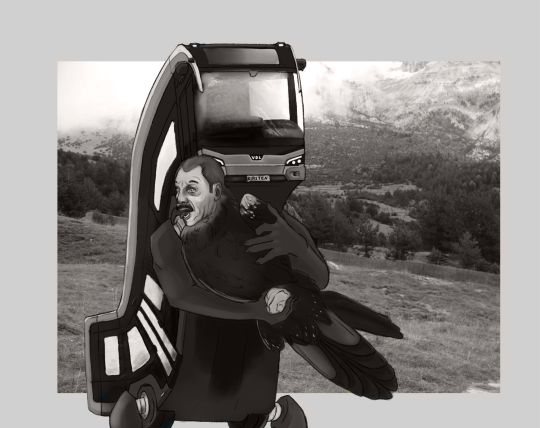
#I am SO excited for the artbook#I have never been soooo excited over a book before#like omgomgomgomgomgomgomgomgomgomg
27 notes
·
View notes
Text
An analysis of WKTD and HWBM in relation to psychology, Christianity, and oppression.
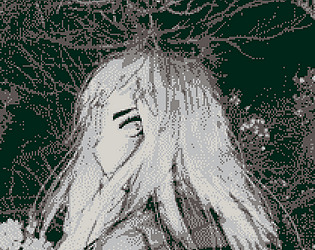

Spoilers for almost all of We Know The Devil and parts of Heaven Will Be Mine (only stuff from when you play as Saturn tho that’s the only character I’ve played as so far)
This post is very much off the cuff so it is quite messy but I really needed to put my thoughts into words, I guess. Hopefully it makes sense, and sorry if there’s any errors!
vvv Analysis under the cut because this post is LONG vvv
Okay because when WKTD said “the devil is the shadow of man cast from the light of god” and when HWBM said that the Existential Threat was just a byproduct of the shadow of humanity cast from gravity (via humanity’s Culture) its like the enemy that humans want to fight is just themselves. The concept of the “shadow self” (also called the id, but I’ll be using shadow instead) in psychology refers to the parts of oneself that does not fully fit in with what society expects of them (Super-ego) and sometimes separately from the true self (Ego), typically leading to rejection of those aspects and self-conflict.
Now, please note that I haven’t 100%’d HWBM but I have 100%’d WKTD, and in that game the true ending results in the main trio all becoming devils and embracing those sides of themselves they’ve been running from for the entire game. The thing I quoted earlier is an actual line from the game said by god, the line following it being “the meaning of this phrase is that there is no devil.” Only through self-acceptance and helping each other alongside ourselves do we really reach the true ending to these stores.
While WKTD leans more towards individuals, HWBM puts more emphasis on the idea of the collective shadow; the story still focuses on individuals, yes, but is very much about the conflict between a humanity that is tearing itself apart over the things that don’t fit the collective image. The main conflicts of the story focuses a lot on that general unrest, and was initially the Existential Threat, but after that dissipated humanity still saw its own shadow, this time in itself. An email you can find in the game even says that “In abandoning Existential Threats to address the threats of our home, it will inevitably result in us turning to conflict between humans one more. And in turn, the Existential Threat will thrive.” The Existential Threat literally feeds on unrest and trauma, manifesting as paranoia and leading humanity to fight it, only for them to find that they were just fighting their own literal shadow.
It’s also important to note that HWBM briefly mentions that the Existential Threat is tangentially related to “their cousins on Earth, and even those are so weak kids with radios can take them out”. This, while it can easily be seen as a nod to WKTD for those who played it, the fact that the reference is super blatant (along with the mention of the Scout programs, likely referring to groups like the Summer Scouts from WKTD) leads me to believe that these two stories exist in roughly the same universe (or at least their worlds do, maybe not the characters present in the stories themselves existing at the same time*). This is for a very specific reason, and it has to do with the themes both of these games are tackling, regarding acceptance of the self, both on an individual and societal level, symbolized by the apple.
Both games reference the apple when talking about the idea of becoming something new, sometimes even beyond humanity. It’s about the embracing of the shadow and all the parts of yourself, seeing yourself as a whole being and accepting all of it. The joy and contentment brought upon yourself by finally letting go of all that repression and division, even if the world around you is going to perceive those parts as scary or ugly. Bad endings in these games are brought about by rejection of the self, which makes sense considering all the themes around queerness and transcending one’s humanity, so obviously and fittingly the true endings focus on healing oneself by accepting all of their aspects as part of the greater whole.
The apple in these stories, especially noticeable in its original thematic incarnation in WKTD, is in reference to the fruit from the Tree of the Knowledge of Good and Evil in the Garden of Eden from the Bible. Man was forbidden from eating the fruit, but Eve (VERY important to note that the dev studio is named Worst Girls Games btw) is tempted by the serpent (was not originally the devil, but came to be in the New Testament) to eat the fruit, which they do and become aware of themselves. God banishes them from the garden for breaking this rule he set out for them, also punishing the snake in the process due to how it tempted Adam and Eve. This incident is referred to as the “original sin.”
What is interesting about this part of the Bible though is what God says at the end of Genesis 3, right before the banishment actually occurs: “And the Lord God said, ‘The man has now become like one of us, knowing good and evil. He must not be allowed to reach out his hand and take also from the tree of life and eat, and live forever.’” The specific wording of “become like one of us” in the context of the apple metaphors from the games from Worst Girls Games is super intriguing to me, mostly due to how the idea of becoming something new is super common throughout these stories—becoming the devil in WKTD, and becoming one’s Ship-Self in HWBM.
There’s also the framing of the serpent in these stories, as well. The serpent in modern Christianity is almost always depicted as the devil, tempting humanity away from God throughout almost the entire scripture. In the book of Revelation, the devil is said to have gone to direct war against God and fighting against his angels; “Then war broke out in heaven. Michael and his angels fought against the dragon, and the dragon and his angels fight back. But he was not strong enough, and they lost their place in heaven. The great dragon was hurled down—that ancient serpent called the devil, or Satan, who leads the whole world astray. He was hurled to the earth, and his angels with him.” These verses can easily be seen in parallel to WKTD, with how the devil forms are said to be unstable and her world more fickle than god’s, and how in HWBM the Ship-Selves are delicately maintained by the Lunar Gravity Well.
But here’s the thing: the framing of the devil in these stories puts it in the position of being correct, with humanity making the right choice to follow it. This may sound strange, almost like villain behavior, until you remember these games deal with themes regarding repression of the self under an oppressive society, which is why these societies tend to be characterized by Evangelical conservative Christianity. Under this lens, alongside the themes of queerness and transcending humanity (rising to the throne of god, in a way), everything begins to click into place. The idea of being forced to live a certain way by a society that hates parts of your very being is killing our main characters, and they want a way out. The personification of the Collective Unconscious (ex: the devil) gives them this out—even if it’s less concrete and stable than the known world (the light), the unknown world (the darkness) is what truly gives our characters the freedom they desire.
They cannot do this alone, however, as we see in the Bible further into the book of Revelation, when the devil is aided by a beast from the sea and a beast from the earth, all three of them holding one another up and emphasizing one another’s’ powers and authorities. This, of course, most likely is reflected in the games in the main trios we play as. While I am still unsure about specifics, I trust you guys enough to understand what I’m getting at here, even if my speculations are likely flimsy at best. Either way, the idea gets across—the true endings for the games can only be obtained if everyone supports one another properly.
The scripture states that the devil does not have long on earth to do what he wishes (“… [The devil] is filled with fury, because he knows that his time is short.”), but that doesn’t stop him from trying at all. When it comes to the games, in WKTD the main trio stay in the cabin only for the night (player choices start at 7pm and the final one is at 1am, 2am onward being the ending you got, so choices go on for 6-7 in-universe hours), and in HWBM they have eight days to get back to earth before humanity declares them to be a threat. In both stories, our protagonists are all under strict time limits to do what they can in order to get the outcome they desire. As it’s said in WKTD, “the devil only ever gets one chance.”
Even though in the Bible the devil is ultimately defeated, in these games it’s the opposite. This is less about the theology they draw from and more having to do with undoing oppressive power structures through solidarity and community support while doing what you can to avoid infighting. Systems of hate and oppression are easily undone, which is why they put in so much work to scare you away from even trying to undo it and make you fall in line; resistance scares oppressors. Of course, resisting is not an easy task, but that’s just part of the work—they don’t call it a fight for no reason, after all.
Accepting all aspects of yourself and embracing that is the first small, yet very important step, to rejecting oppressive systems as a whole, and when society as a whole accepts what the system rejects, that system will inevitably fall, freeing those who are under it. Even though the world that comes after may be more uncertain and unstable that the last one, we still have each other to rely on and a foundation to build something greater and healthier than before.
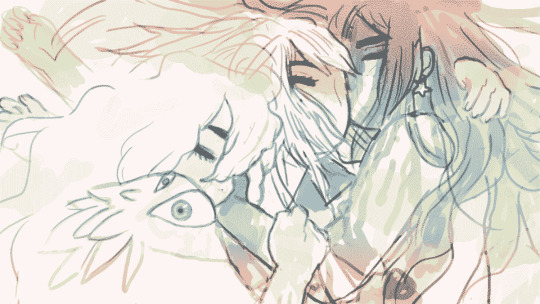
So, roughly and basically…
Super-ego = God = Culture
Ego = Humanity (consistent throughout both games)
Projection = Light = Gravity
Resistance = Radio = Ship-Self
Shadow (personified by Collective Unconscious) = The Devil = Existential Threat
Acceptance (of the Shadow) = Apple (consistent throughout both games), characterized by devil possession forms and Ship-Selves (Ship-Selves are dual natured like that, I think)
… Or something like that. I dunno, I’m not a psychologist.
Once again, I have seen all of WKTD, so I can say these things concretely about that story. However, I have not seen all of HWBM, so it more so feels like I’m making guesses as to what happens in that one, so just bear with me. I’ll be super hype if I’m correct in my theory/analysis.
*On this note, it is very amusing to me to imagine the WKTD trio as space mech pilots. The idea of the main cast of HWBM having to deal with devil possessions is also very fun :3
Sources for information + screenshots I’m referencing
Wikipedia: Shadow (psychology) (links throughout the article lead to other things I’ve mentioned like the Collective Unconscious)
Bible Gateway: Genesis 3, Revelation 12, Revelation 13 (New International Version)
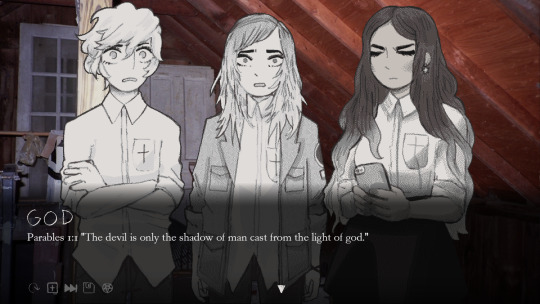
(from WKTD) (not my screenshot, stole this from my friend) (hi Ash <3) (platonic)
(I don’t have a screenshot of the line that comes afterwards or the line talking about the metaphorical apple in the epilogue of the true ending but I know they’re there. I have it in my brain. I’m too lazy to get a picture of it just trust me I know what I’m talking about trust)
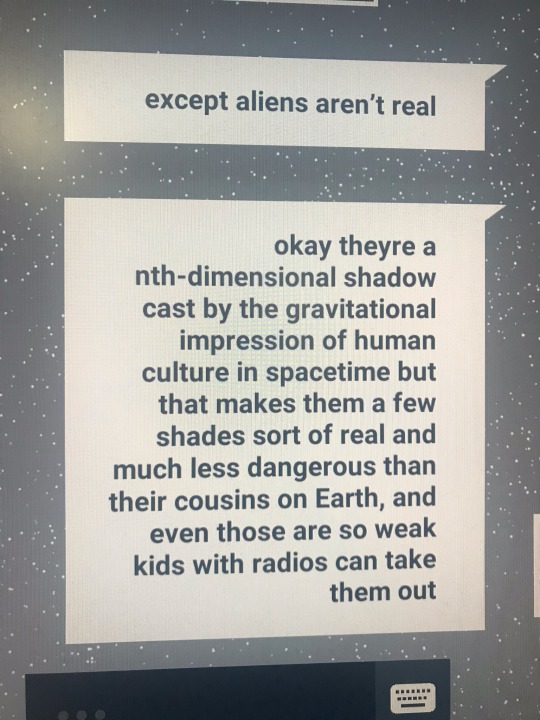
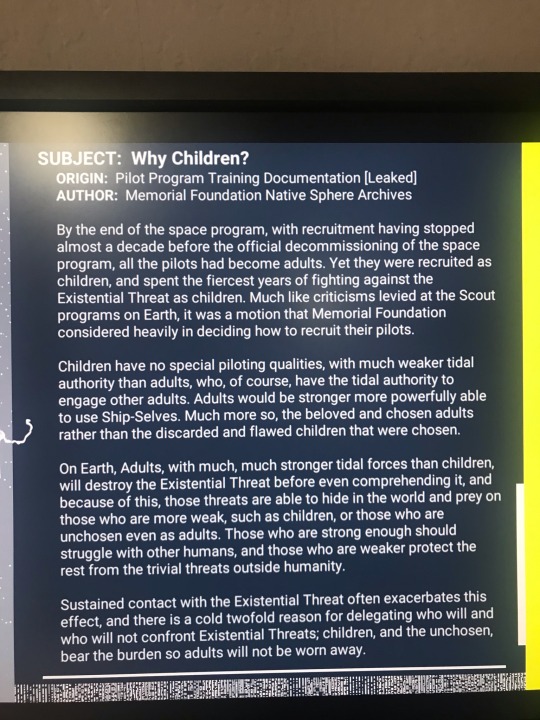
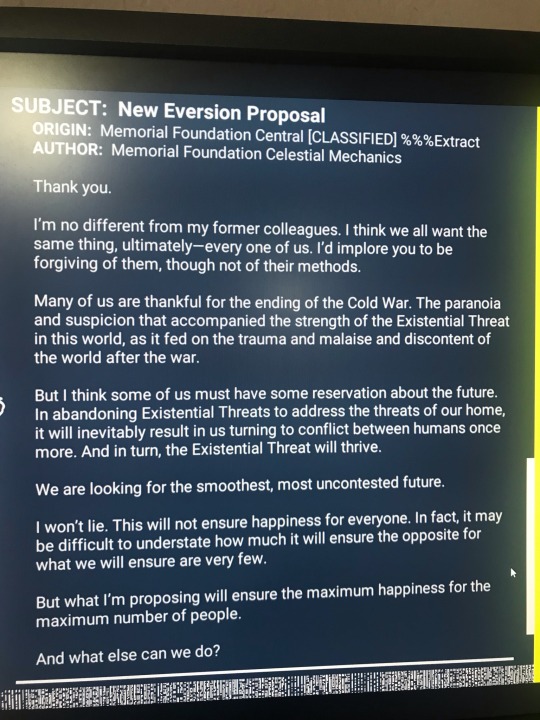
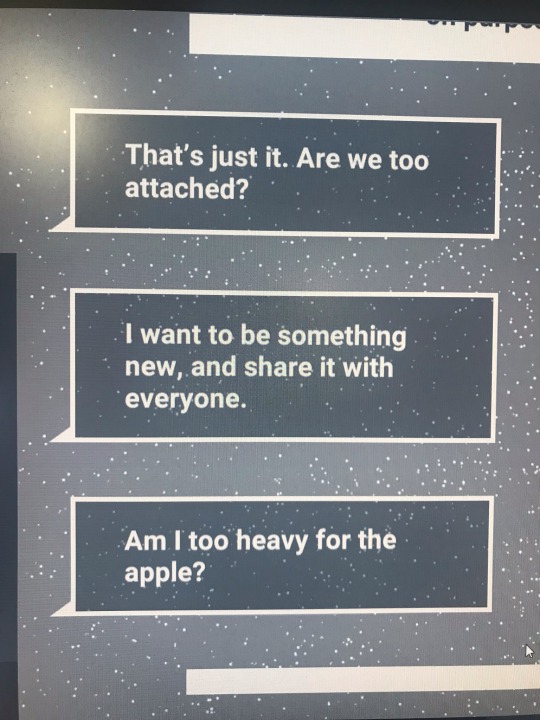
(from HWBM) (screenshots taken by me)
(I don’t have absolutely everything either just work with me here sorry)
#rambles#hwbm#wktd#analysis#sorry guys I had a category 10 autism event and needed to get this out of my system#we know the devil#heaven will be mine
128 notes
·
View notes
Text
Undead Unluck ch.236 thoughts
[These Hearts of Ours Are Burning Red! Their Loud Cry Tells Us to Enjoy Life!]
(Topics: reaction - praise, character analysis - Soul/Sun/Luna/Andy, speculation - Luna/Ruin/epilogue)
Man, what a finale! I've read countless Jump manga over the past twenty years or so, most of which were cut down prematurely, but even among the small handful that successfully made it to their intended conclusions, this might just be the best climax I've seen from any of them
Of course it remains to be seen how well the epilogue really ties it all together, but as far as final battles go at least, this may well become, for me, the gold standard for capping off a series' themes and throughlines. Everything comes together here: the romance, the battles, the power system, the character arcs, the message...it all meshes so well that it's actually difficult for me to come up with anything to say!
Andy and Fuuko so blatantly call back to all of the story's ideas and themes that the chapter really does speak for itself, and my analyses all feel like a rote recitation of the events of the chapter. What can I possibly say that will add to this chapter or make it more impactful for folks?
Still, it'd be a shame to just be silent after such an excellent chapter, and I'd hate to break tradition right at the end! Though, I suppose in a way that's exactly what this chapter is about, huh?
We've Got New Rules
This week's chapter opens by reworking Soul's final line from last week, this time opting to translate it as unfamiliarity with Love being a Rule rather than being a meaningless concept to him. This changes the context of his objection from being that Soul himself is a loveless being to Soul (and by extension, Sun) rejecting the notion that humanity is capable of creating their own Rules
I said last week that it was the role of the Gods to create Rules and the role of humanity to interpret them, but the very existence of Love as a Rule challenges that idea. The Gods didn't create it, humanity did, and as it took out a fusion of every extant antagonistic UMA, it's proving superior to all of the Rules that came before
In other words, in no longer simply negating the Rules, but creating them, humanity has reached the Gods, the end goal of Sun and Luna's game. The Negators are about to beat the game not simply by brute-forcing the final boss, but by proving the boss is no longer needed and humanity can look after itself
The lingering question now that Sun is defeated, though, is what's going to happen to Luna?
Where Do We Go From Here?
Luna spent this chapter looking pretty nervous, and while it'll probably become clear in the epilogue exactly why, for now I think there's a lot of ways to read into that
Considering that she's about to watch Sun die, I think it's easy to look at it as the situation finally sinking in: that this eons-long game is finally about to end, and the status quo will be permanently changed. Whatever Luna's opinion on Sun is, whether she liked him or considered him a bitter rival, the two of them have been together for eternity, and that time is now definitely coming to an end. Even if it's what she wanted, Luna may have never thought it would actually get to this point, or at the very least she was never emotionally prepared for it. She may now, only now, finally be realizing that she does, in fact, understand love, she just didn't know she had it until the moment when she's about to lose it, just like Victor back in L100
Alternatively, it may be because of her attachment to her players. She's been the Game Master almost as long as she and Sun have been in this world, so if she's capable of loving Sun, it stands to reason that she feels something for the Union as well. Now that the end is here, she may not want to see them go - the sadistic choice she built into The Heart for her own entertainment backfiring and forcing her to watch the love she built up being lost while the Union throws their own around with a smile
Or, it could just be self-preservation. As she says, all of the UMA, Artifacts and Negator abilities are going to disappear, but if that's true, then what purpose does she even have? Can she even exist in a world without Sun? If Andy is going to "die" without Fuuko, and Luna may love Sun, then doesn't that mean without Sun, Luna is going to die as well?
If she does, what happens to her? The Rules won't exist anymore, so it stands to reason that Subspace, where souls go after death, won't exist anymore either, right? Unless that wasn't an aspect of the Rule of Souls and was itself simply a characteristic of the greater universe, but in that case, does that mean that Sun, Luna and the UMA will actually keep existing?
And what about the UMA that are friendly? Are you telling me that Clothy betrayed and helped defeat God just to be erased? No happy ending for Clothy? And poor Ruin, he's going to lose the only family he has in Blood and Shadow?
No. No, I don't like that. Ruin hasn't even come back from space yet, and you're telling me he's supposed to reform after having everything taken from him? I don't buy it, and in fact, I think that's the very reason Ruin hasn't come back yet: Tozuka doesn't like that plan either
In a Perfect World
A few weeks ago, I mentioned I had an idea for how Ruin would play into the aftermath of defeating Sun, but I neglected to go into detail because I didn't want to divert too hard from what was happening in the moment. Now that we're seeing the possibility for an ending that explicitly leaves out one of our most beloved cast members, though, I think the time has come for me to share what I came up with
Ruin's belief is that the world that God created is inherently perfect, that the status quo is correct and deviation from it is wrong. This is why is birthmark in L100 and scar in L101 never faded after becoming Unruin, because he believed that his suffering was part of God's plan, and therefore was already perfect: unruined
However, because he believed that God's will was perfect, he also never made any attempt to reinterpret Unruin as an ability; why would he? It's perfect the way God made it. It doesn't need to change, and there's nothing anyone can meaningfully do to ruin God's world in the first place anyway, so why bother doing something so superfluous as externalizing Unruin?
With this chapter, we realize that the answer to that question is the same as the answer to every other question: for Love, of course
Ruin loves the world as it is. He loves God and the Rules, he wants a world of order, one that makes sense. In L100, Ruin believed that the Rules created by humans were arbitrary and imbalanced, and there may well be some truth to that: as I said, the Love that humanity has just used to slay God is condemning the UMAs that weren't fighting on God's behalf. Is humanity's Love reserved for humans?
If so, then no matter how limitless it is as a power source, Love is inherently flawed, imperfect...
Ruinous
Ruin cannot possibly abide by such an unfair world that would go out of its way to make everyone happy except for him and the one demographic that he actually cares about, so it would only make sense that his capstone would be to negate the ruin of the world as God made it
Originally, my thinking was that Ruin would externalize Unruin specifically to fix the physical damage that Sun is doing to the Earth, as the very continents are currently being shattered by his attacks, but with the revelation that the UMA are set to simply be deleted, I think it's also likely that, like him, they'll be given a second chance in the final, validated iteration of the world
I don't know how this will manifest in every case, but I imagine that the majority of UMA will actually reincarnate as humans. Monsterous UMA like Spring would still be large and imposing folks, but he'd be able to play games without scaring off everyone who sees his face. The more humanoid UMAs like the Superior Rules would retain the majority of their designs, and would likely end up in parts of society that allow them to continue to live as they please
It's funny to think about UMA getting jobs, but just imagine Change becoming an actress, being able to become a new person every day, never stagnating as any one thing. Maybe she'll even star opposite Sean, with expert makeup artist Gina perfectly transforming both of them as they're seen by all
There's a happy ending in there for everyone if you look hard enough, and I just don't see Tozuka leaving us with the bittersweet aftertaste that would come with sacrificing Clothy of all characters, so I have to assume that Ruin's notable absence is meant to facilitate a workaround to that oversight
If I'm wrong though and Tozuka just...didn't really consider how upsetting that would be, at the very least Tozuka has kept the focus on the most important thing: Andy and Fuuko's relationship
Together Forever
Before dealing the final blow, Andy thanks Fuuko for giving him a way to die: being forgotten by Fuuko. I suggested a few weeks ago that this logic was going to be how Andy saved her, externalizing Undead to protect Fuuko's memories, but instead Andy's accepting that he's going to die with Fuuko
I thought that was kind of an odd thing for him to say at first, since a) in a literal sense he'll still be alive, and b) it definitely doesn't fit the idea of the Greatest Death Ever, but then Andy kept going. He says that if/when he and Fuuko meet again, he'll revive
It may be obvious to say, but this isn't the death that Andy wants, and he has no intention of letting it be what takes him out. It's going to hurt, it's going to be hard, and it'll feel like dying, but after it's all over, their life together can truly begin
Until next time, let's enjoy life!
13 notes
·
View notes
Note
Holaaa, First of all I want to tell you that I really like your account and your analysis💖Your points of view are very accurate and you give me my daily dose of hananene, so thank you 🫶
Now let's get to my question, it is not new that AidaIro makes "jokes" about Hanako harassing Nene, however this usually reaches strange limits, let's say, that Hanako tells Kou that he has touched Nene's breasts (clearly a lie) wanting to see up her skirt in a final comic of the Guardians of the Clock arc, hinting at her a lot, in another final mini comic he imagines what it would be like Nene if the water won't affect her (She would clearly be naked and he knows it) I even once saw a user of this app talking about how there is a fairly old mini panel drawn with a pencil in which Hanako wants to imitate a scene with Nene from the romantic movie Ghost (a scene that ends in something sexual) and the most famous imagen:
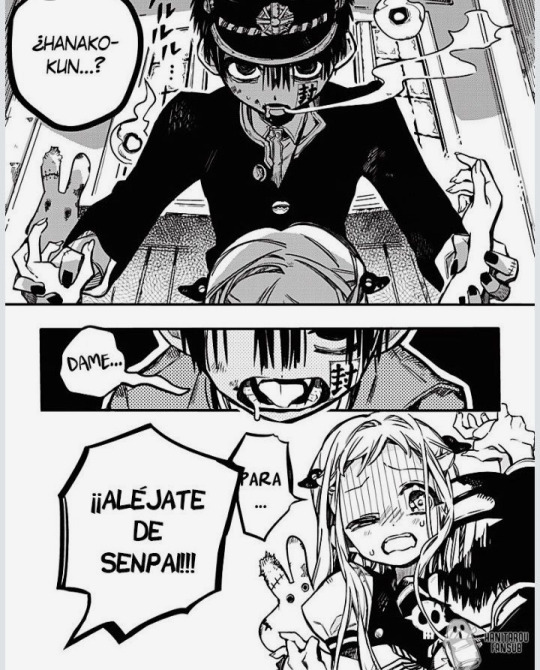
Clearly if you see this scene without having some context you are going to think badly, everyone thinks badly, the link I am leaving you is an analysis in which it is mentioned that eating and sex go hand in hand in the manga.
https://www.tumblr.com/theevilthatismokke/698270204867788800/the-myth-of-sumire-and-hakubo-jshk-chapter-94-and
And so we could continue talking about the many times that Hanako makes advances to Nene, to which I asked myself this, is Hanako sexually attracted to Nene? Maybe my question makes you uncomfortable, so if so, don't answer it :), even I feel bad and uncomfortable asking you this, I would just like to know your point of view, I also analyze these characters.
Many greetings from Mexico ☺️
Aww I'm the one who thanks you for your kindness, I'm very happy that you're enjoying my posts >.<
This answer was a little long, so I'm going to put fewer images to avoid making it twice as long, I'm going to rely on your memory on this one haha
Finally someone asked about this, and I'm immensely happy because it's a subject I've wanted to address for a long time. It turns out that I never really went into depth about it because I didn't know if people would feel uncomfortable.
JSHK has very strong and heavy themes, so I try to be cautious when talking about some things, even if I have theories about the topic. But to be honest, I'm thinking about talking to people about it.
Some of these themes are important to the main plot, and their analysis has a very important outcome for us to draw some conclusions about the characters' behavior, but anyway, returning to your question, let's talk about two of these themes, and one of the most controversial.
Hanako died at age thirteen, but he maintained his consciousness and physical presence for over fifty years. People still debate his mental age today, some say he has a mental age equivalent to the age he died, others say he already thinks like an adult.
Hanako has a duality, he will never be just "one" thing always, he is not just a good boy, but he is also not just a bad boy, I can spend hours exemplifying this, but that is not my intention, making it clear that this applies to most of the characters, so since we're talking about his mental age, this applies too.
He acts like a child, not like Tsukasa, but you still see him playing with toys or playing with other people, Hanako likes to have fun. He also has some childish thoughts about some things and does wrong things like a child. Tsuchigomori is sometimes seen teaching him things, as if he were responsible, like when the boy wanted to sell Tsuchigomori's objects without permission to buy a hat, the teacher teaches him that this is wrong and he understands.
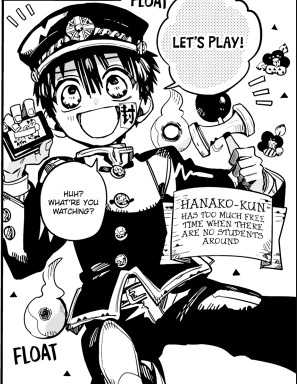
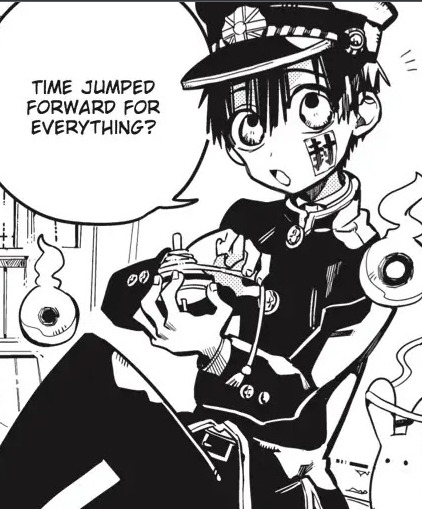

We can clearly see that there is a very childish side to him, but at the same time he also has a more adult side. Let's consider him to be a side younger than an adult properly speaking. Hanako was thirteen years old so he was in puberty, about to leave pre-adolescence and enter adolescence. In fact, sexual desires are common and very latent at this age.
But, we are already talking about two topics, I will separate them so that we can better understand the connection that sex has with hunger.
Let's start by talking about sex.
Hanako clearly has strong and very latent sexual desires, this was made very clear from the beginning, what happens is that the "comic" side of the series leaves this as a situation that is supposed to be "funny" as if it were just a joke. It is common in works to see perverted characters being used as comic relief, but this does not apply to JSHK.
Hanako does indeed have latent desires, the way he acts, the way he behaves and the way he looks at Yashiro is almost always with a lot of desire. Just look at many panels of the manga, the way Hanako looks at Yashiro with desire, as if he was always about to kiss her, the way he is always touching, hugging, putting his arms around her, it's because there is a desire he tries to control.

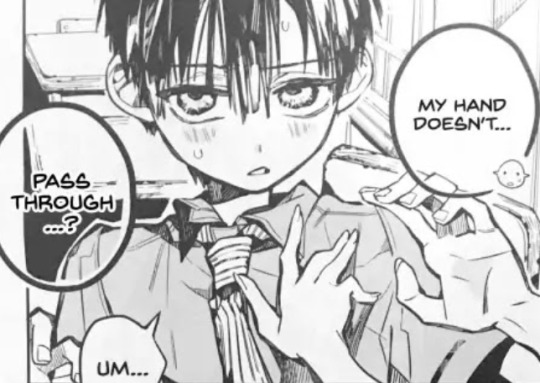
The face he made when she was touching him
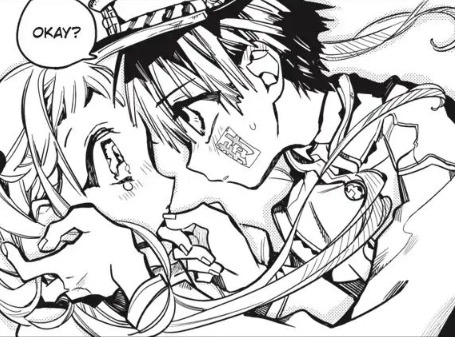
I talk more about his desire in this post here
Make no mistake, Hanako has actually touched her breasts a few times, I talk about that in this post here
Hanako doesn't just feel desire for Yashiro, he has a sexual desire that is natural to him, that is, this desire didn't start because of her. He always walks around or finds some suggestive items.
Erotic books (whether with girls in bikinis or magazines teaching what to do at "the right time" such as the magazine that teaches how to reach your girlfriend's G-spot)
Books teaching how to win someone over (like the one he used to help make Yashiro's wish come true) the book was very worn out, which means he read it very often. This indicates that he was wanting to learn to do it with someone (conquer someone).
The Kokeshi doll.
Let me tell you about this doll. There are some meanings behind it, such as the fact that it is used as an amulet to guarantee the protection of children, but at the same time the doll is also associated with sex and the sexual desire of boys, due to its shape.

On some Japanese sites I found it being linked to use for boys' sexual "relief", if you know what I mean. Not only does Hanako have a kokeshi doll, but he also thinks it's "Sexy." Again, people associated this moment where he says this as comic relief, but the signs are there.
See other examples

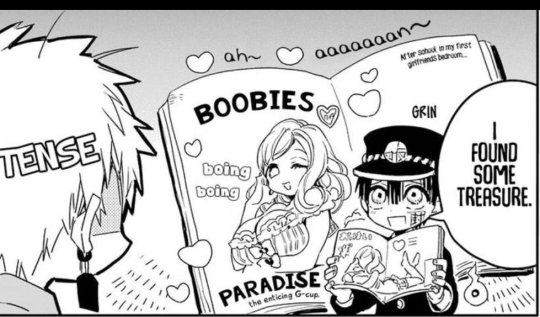
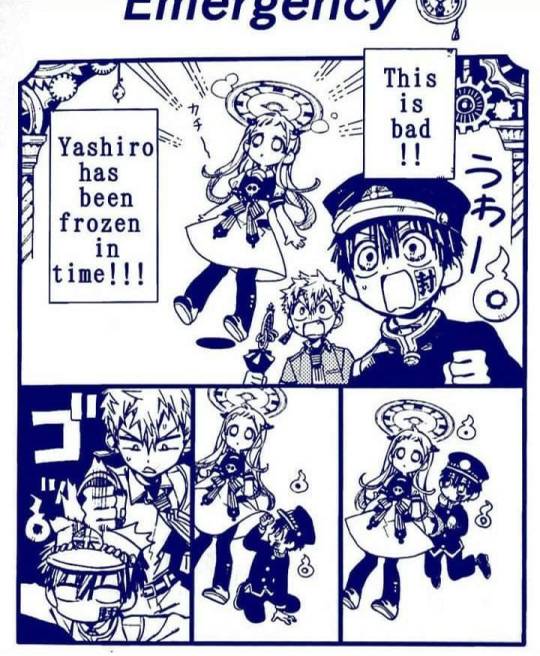
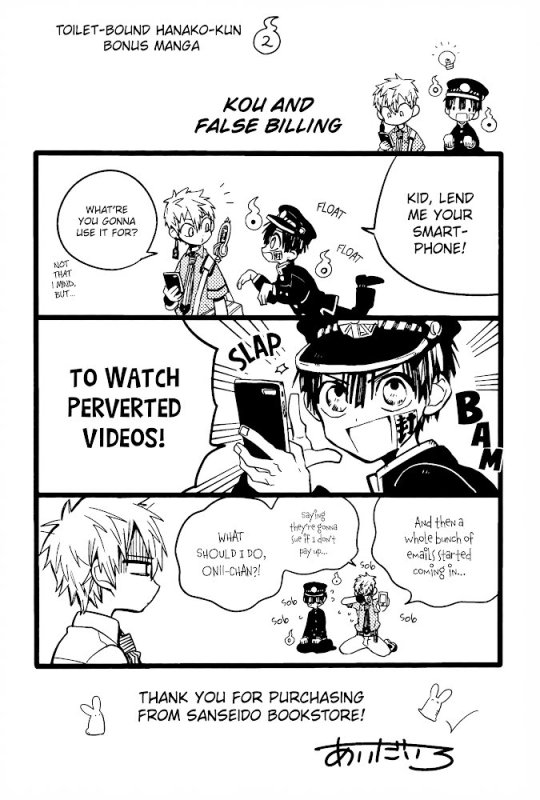





So, let's move on to the sexual desire he feels for Yashiro.
When Hanako was a child, he said that Yashiro was his type, that is, he had been attracted to her since that age (even though he was so young). When Nene met him again when he was older, the first thing Hanako did when they formed a bond was flirt with her, and he flirts very often.
His flirtations are different from those we usually see in other works. He always uses touch when he does, and Nene has noticed this to the point of claiming that he sexually harasses her. Do you see that Yashiro herself noticed this? At first Hanako had no criteria, he actually didn't care about touching her or imagining her naked, trying to look under her skirt or watching her take a shower (despite her turning into a fish).
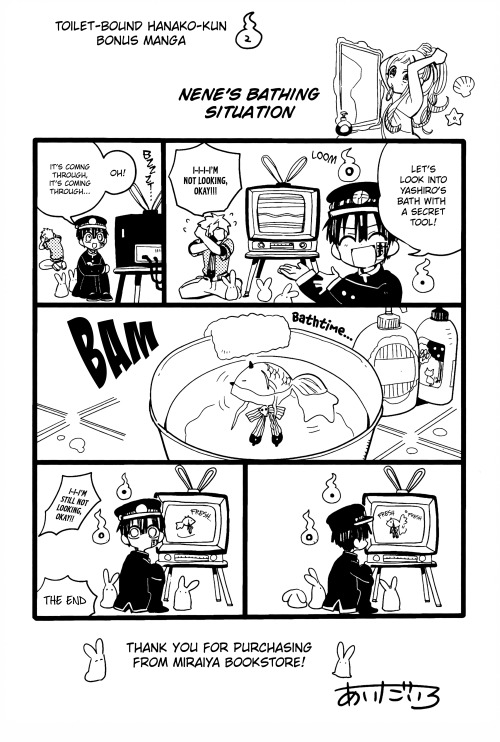
And he didn't care because it was purely physical, he actually felt a strong sexual desire for her, even though she wasn't the only one. Yes, Hanako has also touched Aoi-chan, and even talked about the size of her breasts.
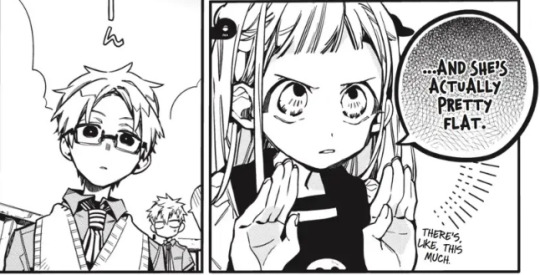
Then, Hanako falls in love with Nene and his way of acting subtly changes. We saw how he was reluctant to go after Yashiro when she went to take a shower with Sumire because he was afraid Yashiro would be mad at him. Do you think he would do this before? Hanako now has feelings for her, so he starts holding back.
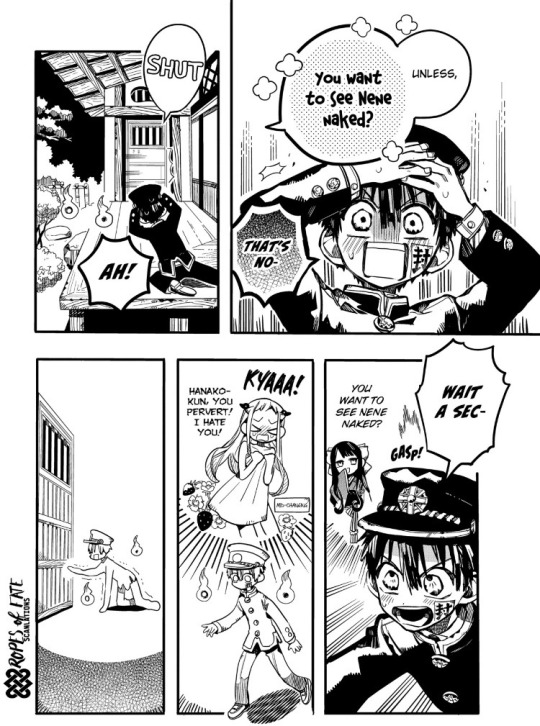
Holding back is something that represents Hanako well.
And we see this all the time, the confirmation that he holds so much back came precisely in the chapter on the mokkes of the dead. Hanako doesn't have his normal consciousness, he's letting himself be carried away by his desire, in this case for sweets, but did you notice that he recognized Yashiro's voice when she called him? And the way he "attacks" her is different from the way he attacks Kou. We clearly see the sexual connotation here, Hanako's desire for Yashiro, and he pursues her until the end.

The way he "attacks" Yashiro
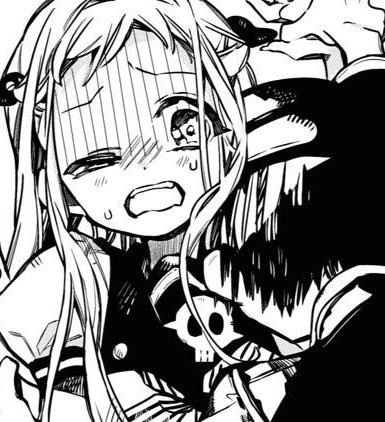
the way he attacks Kou
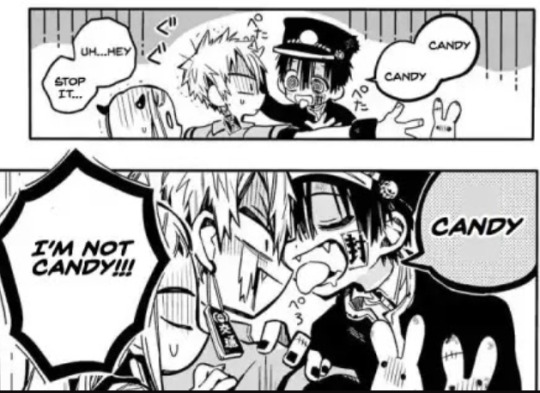
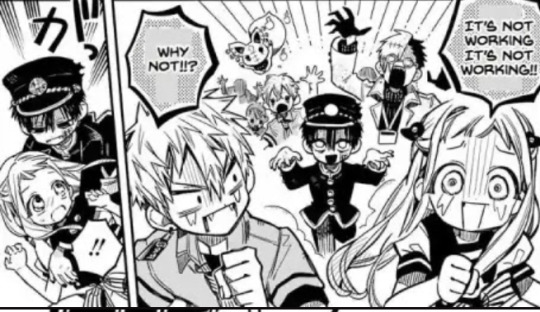
see his eyes of desire in this last panel
In this chapter we see that just by "relaxing" a little, he already tried to fulfill one of his own desires. Hanako already had several opportunities to kiss Yashiro but he was always holding back, he couldn't hold back any longer during their reunion because he hadn't seen her for a long time, because she risked her own life to see him, she saved him from Teru and She still confessed that she loved him. He couldn't hold back any longer and kissed her.
So, I've been thinking about this whole situation and whether Hanako would start putting pressure on Yashiro if they started dating. If Nene is his girlfriend, he'll be able to tease her, right? I was wondering if this possibility could happen and I started to think so after what happened between Hakubo and Sumire.
So, after an intense kiss between the two, would we see Hanako trying to touch Yashiro? Or even succeeding? Nene is not difficult to convince, and she must know that when she wanted to have a boyfriend, sex would be part of the relationship, the question is, how long could Hanako stay before he started wanting to consummate with her?
This is where I start to talk about the second theme, "hunger".
You sent me the link to a post (very good indeed) talking about the relationship between eating and sex, which are directly linked to JSHK, and it actually makes perfect sense. Aidairo made it very clear that this duality exists and the constant use of this metaphor.
That's because sex and hunger have one thing in common, desire
Everything in JSHK is about desire. Make wishes, fulfill wishes, always wishes.
Hunger and Sex are represented by the desire to obtain, to consume, to obtain something at will. Or are you going to tell me that you don't feel pleasure when you can eat delicious food when you're starving?
Eating is a word that actually has a sexual representation not only in JSHK but also throughout the world. I'll give you a personal example here.
In the country where I live (Brazil) the word "eating" is almost a synonym for sex, depending on the context in which you use it. If you say that you desire or want to "eat" someone, the person listening to you will SURELY understand that you are going to have sexual relations with the other person and that you will be the one who will be on top (active). So, if you come here haha, don't use that term because people will interpret it as being about sex.
I want to eat someone is the same thing that I want to have sex with someone. It's a very popular term even though a lot of people hate it (especially women).
I imagine that in other places in the world the word "eating" could be related to sex too, not just here in Brazil.
So back to JSHK, let's talk about hunger. We know that cannibalism is present in the work too, in addition to the extra arts in which the characters are represented as food or something like that.
We see Hakubo and Sumire's relationship, and we have to admit that the moment Hakubo went to "destroy" Sumire, he ate her. It was very obvious and very clear that it was a sex scene.
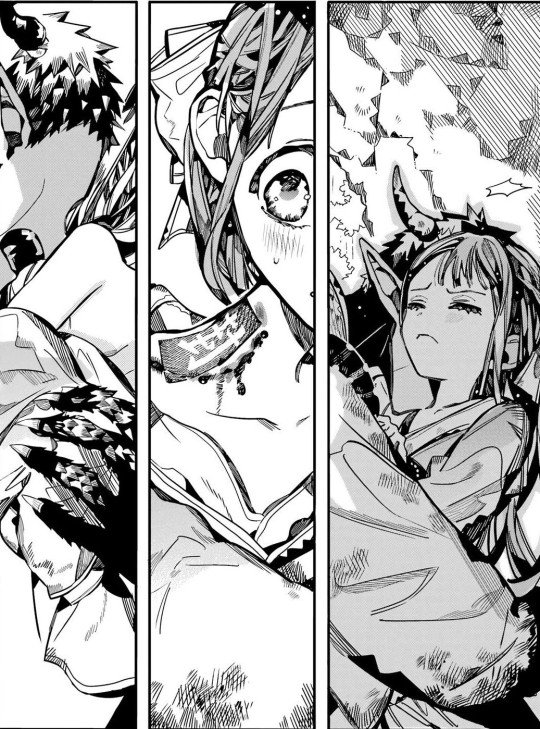
Obviously not in the most common way, but remember that Aidairo literally uses eating to represent sex itself. This is the most explicit example we have in the work (for now).
So let's move on to another topic, the way supernaturals relate to humans is different, of course it's different. Supernaturals like to devour humans and the way they deal with feelings is different but at the same time similar to that of humans.
Hakubo was a supernatural, he was born that way, and he reflected what was part of his nature. He did it the way he liked, he could have destroyed Sumire in any other way, but he chose to eat her, to consume her.
Do you know who is also a supernatural?
Hanako
Even though he was a human and understands better how relationships between humans work and that he can actually fall in love, he is still a supernatural.
Hanako is also hungry, and the whole time he is next to a kannagi girl, and he said that kannagis are delicious for supernaturals.
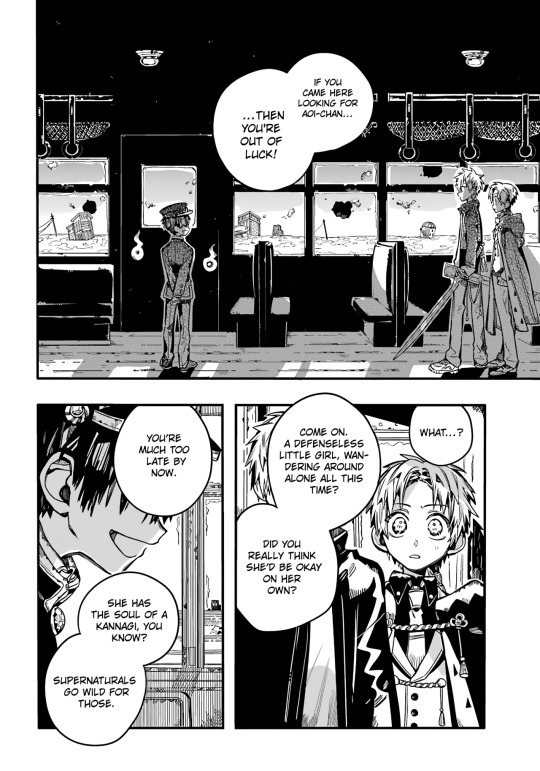
Hanako feels desire for Yashiro, he is a supernatural, she is a human with that title, with the blood that supernaturals desire. So, Hanako wants to eat Yashiro?

What if in the end Hanako has to "consume" Yashiro in the same way as Hakubo and Sumire? It's a possibility.
He has to stop himself from doing that. Which brings me to another point that people don't really like to think about
Hanako's relationship with Tsukasa.
Have you ever stopped to think? Tsukasa is Hanako's yorishiro, and if Nene doesn't remove Tsukasa's seal, will Hanako have to "eat" Tsukasa too?
Tsukasa seems to be looking forward to it.
What kind of relationship did these two have?
I won't delve into that now, let's get back to Nene and Hanako.
Their relationship is troubled, not only because he is supernatural and she is human, but also because of the way this relationship develops. There is a supernatural side to dealing with "love" and "desire" that we don't know about, but which is dangerous.
Hanako desires Yashiro in human form (sexual) and also in supernatural form (hunger), he wants her in the same way that Hakubo desired Sumire. Hakubo was supplying both, wasn't he?
It could be the same thing with Yashiro, it will depend on Hanako and how much he can control himself, which side of him will speak louder? the human side or the supernatural side?
This is the question he fears so much, he is afraid of his supernatural side, and the proof of this is the desire he has to remain sealed because he can control himself.
Hanako's human side wants to touch every part of Yashiro's body, wants to take her as a wife, wants to give and feel the purest pleasure with her, but the supernatural side actually wants to consume her, wants to devour her.
Which of these sides will be able to win in the end?
It's like I said, everything always begins and ends with a wish.
Hahaha the answer was longer than it should have been, sorry, but I loved finally being able to talk about it. There are a lot of things I think about these topics, but I'm still thinking about whether I'm going to talk about it or not, I need to know if the public is okay with it.
A big hug to Mexico from Brazil \o/
I hope you liked it, thanks for the ask! ♡
#jibaku shounen hanako kun#hanako kun#toilet bound hanako kun#amane yugi#hanakokun#jshk#tbhk#jshk spoilers#aidairo#yugi twins#hanako anime#tbhk hanako#hanako x nene#hanako x yashiro#jshk hanako#jibaku shoujo hanako kun#nene yashiro#tbhk manga#yashiro#yashiro nene#jshk yashiro#tbhk yashiro#hakubo#yugi amane
138 notes
·
View notes
Text
So continuing the analysis of Genesis (and the rest of ff7 consequently) through a Homeric lens from this post because I cannot get it out of my head
I was doing research on the Iliad and was reminded of the huge influence the theme of choice has on the narrative—
“If I remaining here besiege the city of the Trojans, my homecoming is lost, but my glory (kleos) will be imperishable—but if going homeward I reach my own fatherland, good glory is lost for me, there will be life for me for long, and death’s end will not reach me swiftly.”
-Achilles, Iliad 9.412-16, my own translation
Achilles has the choice between becoming a hero and living a quiet but happy life in the Iliad. Not all homeric heroes have to make this specific choice, but I think considering other themes as well that Genesis is definitely an Achilles figure.
The realization that started me down a spiraling path that prompted me to post this was that I think Genesis was also operating under the assumption that he was an Achilles figure, and therefore that he (and the other SOLDIERs for that matter) had this same choice. He thinks that he chose to leave Banora, therefore forsaking a quiet normal life, to become a hero; and he did, but it’s also a lot more complicated than that, especially from his perspective.

When he finds out about his origins in Project G, and especially when he finds out he’s dying, he feels the true weight of his choice in that dilemma for the first time. He has no way out now, he’s locked into the path of glory and death, and he doesn’t even really feel he got the fame he should have with it. Sephiroth definitely got the fame, but you don’t see him degrading (he’s definitely got his own stuff going on, but I don’t think Genesis was really thinking about that).
But I think what hurts him even more than that is that he sees Project G being one of the foundations of SOLDIER and then he sees himself returning to SOLDIER years later, and he sees the threads of fate binding him to this doomed path, with Shinra pulling the strings of his entire life, and he sees that he never really had a choice, and that’s why it hurts him so deeply (one of the many reasons, at least).

Also (and I mentioned this a little before) I think something prompting his jealousy is that he projects this choice theme over Sephiroth, when really Seph never had the choice, not even the illusion of it like Genesis had. He even says to Glen and to Genesis later on in Nibelheim that he would chose the normal life over undying glory, but by then it’s too late for an understanding; too many lines have already been crossed and they’re all trapped in the loom of fate.
The real tragedy of all this is that they didn’t have a choice, none of them did. They should have. Genesis should have been able to choose, like Achilles, but he wasn’t. There may have been some stuff with Achilles’ choice ‘fulfilling the will of Zeus’ or whatnot but I honestly don’t remember at the moment, and that would make the connection better anyways with Shinra being the Zeus in this situation.
Also, as a random sidenote, I love how the homeric hero side of Genesis lines up so perfectly with the biblical apple symbolism here—the themes of choice are aligning!
Anyways yeah I don’t know if I actually said anything with this or if I was just yelling into the void, I zoned out and lost my train of thought many times while writing this. Hope you enjoyed if you read all this I’ll definitely probably do it again because I am very bad at focusing on the work I’m actually supposed to be doing lol byeeee
#still so behind on my thesis#all my notes turn into this instead#iliad fantasy 7#final fantasy 7#classics#the iliad#genesis rhapsodos#analysis#ff7#crisis core reunion#ffvii#sephiroth#tragedy#and yeah I know the classics definition of tragedy is not the same as the modern one but I’m using the modern sense here#star essays#star rambles
14 notes
·
View notes
Text
Oh my god this CHATGPT generated "Article" about James Somerton
(I have bold italic'd the parts that made me react...either with a giggle or with confusion)

James Somerton engages audiences of all ages with his infectious YouTube content including commentary videos on books, comics, and films. Recently, he made a disturbing social post that stirred the web.
James Somerton is a renowned YouTuber known for his intelligent video dissertations on literature.
Through engaging storytelling and rigorous analysis, he illuminates the diversity and depth of LGBT narratives, asking viewers to join him in exploring these rich literary landscapes.
James’ enthusiasm for his subject is evident as he eloquently explains the value of representation, identity, and acceptance in literature.
Through his platform, James Somerton educates, entertains, and inspires audiences to embrace the intricacies and beauty of the LGBTQ narrative.
However, due to controversies, he posted a suicide note on his Twitter, leaving his audience in awe, raising speculations and skepticism regarding his death and the discovered suicide note.
James Somerton Audience Of Various Age Groups.
His death news is considered to be a rumor as reliable sources haven’t confirmed the news yet, we are opt to consider him alive before jumping into conclusions.
The renowned YouTuber James Somerton, is born on December 22, 1988.
He is in his mid-thirties, having reached this age after being born in 1988. So he is approximately 35 years old.
He’s been around for a while, growing up with the internet’s expansion and experiencing the rise of services like YouTube.
Despite his age, he injects young vitality into his videos, engaging with audiences of all ages.
He has enough expertise to impart advice and insights, but he maintains a vibrant energy that makes his work fresh and entertaining.James Somerton is known for creating video essays. (Source: Tiger Media Network)
His age does not define him; his enthusiasm for generating content that connects with people distinguishes him.
Whether analyzing the most recent trends, sharing personal tales, or delving into thought-provoking themes, the YouTuber’s honesty makes him relatable to his viewers.
In a world where age might be overrated, James reminds us that what you bring to the table is more important than your age.
And for him, that means a lot of innovation, humor, and a genuine connection with his audience.
So, despite his age, he continues to engage and inspire people worldwide via his entertaining YouTube channel.
James Somerton Wikipedia: Who Was He?
James Somerton is a well-known Canadian YouTuber who created video essays that examine media via a queer lens.
He delves deeply into issues such as films, television series, and the LGBTQ+ community, sharing his take on numerous themes.
James isn’t hesitant to discuss challenging or taboo matters, such as social unrest.
James’ YouTube channel has over 240,000 subscribers with a rising following base.
His content is not restricted to serious subjects, however. However, in December 2023, James encountered some difficulties.
Despite his tribulations, his work provoked discussion and fostered understanding among his audience.James Somerton had a background in education from Carleton University. (Source: X)
He also went into pop culture phenomena such as Harry Potter and Marvel comics, providing his observations and analysis.
Accusations of plagiarism appeared related to his video writings, prompting strong condemnation from his internet followers.
This outcry ignited a heated debate regarding creativity and ethical content creation.
Despite this setback, James remains significant in the YouTube community and is known for his thought-provoking work and distinct viewpoint.
While the scandal had generated a commotion, it did not reduce his effect or influence as a content creator.
He is also committed to promoting diversity through his videos. This commitment cemented his position as a significant voice in the YouTube community.
James continued to captivate his audience with his natural voice and insightful commentary on various topics.
#not putting link here because content mills don't need the clicks#but you can see i included a screenshot of my source at the top#chatgpt#ai#james somerton#“news”?#literary!?!?!?#why is his AGE a huge talking point with this AI?
13 notes
·
View notes
Text
Personal reasons both on and offline have led me to be less active. However, someone’s analysis on Kuroe (please don’t find/go after them) reminds me of what they had said when the anime’s ending was new and fresh. Most people, myself included, were rather bitter, you see, so we didn’t want to see people just…act in a way that we felt was callous and cold to her. I in particular got super attached to Kuroe. This girl is a lot like Homura, and also a lot like me. However, to call her just Iroha’s Homura is reductive and doesn’t do her justice. Kuroe is her own character with her own wants and desires. Even if some of us thought she was (the first) Kuro, or then Homura’s long-lost sister before canon said otherwise, the point is we love HER. We want HER to be happy. Rest under the Read More. Content warnings for discussions of death and suicide, as well as spoilers for the last four episodes of the anime of Magia Record:

Some people think Kuroe becoming a Witch in her despair was thematically appropriate. That the theme in Anireco is moving on from the past so you can look towards the future. That the way Kuroe became a Witch fits in perfectly with the franchise.
I disagree. I was bitter then, and I’m still bitter now.
I feel Kuroe should NOT have become a Witch, especially in the way she did. Yes, lots of Magical Girls become Witches when their feelings of hopelessness and despair reach a fever pitch, but Kuroe’s case felt especially cruel. It pretty much is framed like a suicide, where Kuroe desperately tries to escape from the Labyrinth, then doubles down on the idea that NO ONE can help her. That she is BEYOND any hope of happiness. That she just wants her pain and suffering to end. To say nothing of how her Witch was put down by Iroha, literally framed like putting a rabid dog out of its misery. And then, her death was used to help galvanize Iroha. It really feels like they made this amazing, relatable character…just so Iroha could get to where the story needed her to be, given she also loses Ui, Touka, and Nemu for good in this continuity.
Am I just angry at them not giving my favorite character a happy ending? Hell yes, I am! But people who are better wordsmiths than me have written about how the writing that led to this is not great. How it arguably feels more fitting for Magical Girl Site or Raising Project than it does Madoka Magica, and considering the kind of shit that IS in the original anime and Rebellion, is saying a LOT. Which is a shame, because what we had before this was SO GOOD. And then, the last few episodes happened. And this is the SECOND TIME this has happened to me in series I like!
Although, if there is a silver lining, someone in the game staff seems to have agreed with me. In the game, Kuroe is alive, well, and thriving! She’s in a position to where she’s starting to let Iroha in, and we even get details and context to Kuroe’s backstory, which is amazing.
I can take her never meeting Homura and becoming the big sister Homura never had, finding something in bonding with each other that they haven’t found in many other places. Obviously, I’d love it, and the fandom has both of them meet characters I feel wouldn’t truly understand them.
However, at the end of the day, I want my favorite character to be happy. And in the game, she is headed that way. Two amazing units, being able to actually bond a bit with Iroha, some of the best storytelling the game has offered yet (I’m biased towards any Kuro, and especially Kuroe), and lots and lots of lore and things you can get by implication.
Characters can be interesting AND happy. They can be allowed to heal without compromising what makes them resonate so dearly with all of us.

“This is the face of a girl we want to protect and ensure never makes the same mistakes we did.”
#kuroe#magia record#magia record spoilers#just ranting#being kuroe is suffering#kuroe deserves the world#cw death#cw suicide#vent
10 notes
·
View notes
Note
Hey, sorry about that Anon that sent you hate about the "Hans is a sociopath" thing, that's not a cool look for the Hans/Helsa fandom and not at all acceptable (and kinda accidentally reinforces the take they hate--that sociopath is just a label assigned to villains arbitrarily). I do want to talk about this though, because your post did make me uncomfortable even though it was well-researched and thought out.
tw: abuse mentions
Personally, I am hesitant to assign that label to Hans because he is a villain/antagonist (that's literally his role in Frozen, I say that as a Hans stan who believes he could be more in the future) and 1) sociopathy is a real behavioral disorder that the narrative will misuse to continue to justify why Hans deserves to be a punching bag, and 2) a lot of the 'sociopathic' behaviors he displays are also behaviors displayed by abuse/neglect victims, and additional content supports that he was abused. "Hans is a sociopath" and "Hans was abused" are equally canon takes that the narrative does not treat respectfully. Which take people "prefer" likely depends on whether and HOW they relate to Hans (or Anna/Elsa).
Jen Lee herself has also said that Hans is a product of being 'raised without love' so in full context, there is uncomfortable territory of "if Hans is a sociopath... does that mean he deserved to be abused and unloved?". Narrative seems to support this as we continually see gag takes of him being hit or purposefully excluded in ways that other villains aren't. I very disagree that Jen Lee "likes" that Hans is a sociopath or is "excited" about it. It reads heavily like justification to keep him Disney's punching bag to me.
I think people need to learn to better articulate what makes them upset/uncomfortable about some takes, instead of jumping to becoming abusive themselves. You can step back, take a breath, analyze and THEN respond in a healthy constructive way, guys. And if you can't, then don't engage at all, it is not worth hurting yourself AND someone else.
I understand your concerns here. This is one of the reasons I reached out to my friend, BG (who is actually diagnosed with ASPD, the DSM-5 name for sociopathy), to ask for his opinion before actually writing my analysis of Hans' character and sociopathy. The comments here and here are from him and are not my own opinions or thoughts. BG is also a psychologist, who works with others who have ASPD. He's knowledgeable on this subject, from personal experience and the experience of others. I also want to say that I myself have worked in Special Education for 6 years, and I am neurodivergent - thus, I want to reassure you that I am not coming at this subject completely new.
I also understand where you're coming from in terms of using the diagnosis as a way to 'misuse to continue to justify why Hans deserves to be a punching bag.' As soon as the label is used, most people become repulsed - including Hans fans. BG and I also both agree that Jennifer Lee obviously romanticized the label when she was writing Hans. She saw it as a way to make Hans more 'interesting' than the usual Disney villains, rather than respecting it as an actual diagnosis. That is what BG meant when he said that Jennifer Lee loves the label - that she finds it cool and takes pride that she was able to include the behavioral elements and have it relate to the overall themes.
You are also correct that Hans is both an abuse victim and a sociopath. Sociopathy is typically the result of abuse, after all, thus it makes sense that he is both. Jennifer Lee also makes this very clear, in the quote you also mentioned. Thus, I do not believe that it was her intention to say that sociopaths deserve to be treated poorly - she just chose to use it as a way to make Hans 'more interesting'. Which is also very problematic, just in a very different way.
However, I'm not trying to be obtuse here - I do realize that Hans was only even considered to be written as a sociopath because he was a villain. Sociopathic behaviors are always associated with villainy, after all. Most of society has an overall lack of understanding from both sides, empaths, and sociopaths. BG explained it well here -
Empaths always make us out to be villains or funny anti-heroes because they can’t fathom our behaviors being used for good. It’s a reality we face, especially in this day and age when feelings and being empathetic dominate the social world. There is no easy way to showcase a sociopath being a hero within empath standards.
I agree that Hans is treated differently. However, I wrote here what the reason for that is, and its not because he is a sociopath (since most casual fans do not even know this aspect of Hans' personality), its because of the realistic implications and emotions of his character, which we still have to acknowledge -
I think the reason for this treatment is because of the uniqueness of Hans’ overall character. Not only was he a twist villain, but he was a romantic interest for Anna - making him a little too realistic for many people. Yes, characters like Frollo and Gaston also share the qualities of men trying to take advantage of women, and Mother Gothel does indeed show signs of a realistic abusive parent. But they’re shown since the beginning that they are villainous, which helps the audience know to emotionally disconnect from them. This is the same for most villains. Hans was shown to be desirable and then changed, which is what realistically happens when people are trapped in abusive relationships. We form attachments to these types of people and it’s hard to just disconnect. It’s difficult to just place him as a 'deliciously fun’ Disney villain with the others when he hits too close to home. This is why we see less of a fun side to him, and why we are often just shown him being a punching bag. Hans didn’t just betray Anna, he betrayed the audience as well.
Hans is overall a very difficult and nuanced character to discuss, not only because of the villainization of ASPD and the lack of acknowledgment of his abuse, but also because of real-life abuse victims who have dealt with people who acted like Hans (with or without ASPD). Thus, it creates this strange limbo with him because both sides are valid here. People who display toxic behaviors (again, with or without ASPD) deserve to have their stories validated, but the people they abused also have the right to be validated as well, and even more so because they didn't do anything wrong to deserve the toxic treatment in the first place. It's a very difficult subject no matter how you choose to approach it.
With all this being said, I understand that it is a very nuanced topic that can be uncomfortable, however, ignoring a canon aspect of Hans' personality and not acknowledging it is just as problematic as treating it as a villainous trait. It shows that we are not willing to actually discuss it, and would rather ignore it because it's easier to.
2 notes
·
View notes
Text
I just feel like writing and venting a bit. Whoever reads it, gets a quick reflection of my brain at night as things have been building up for awhile. I’ll ask a question, but at the end of the day what matters? You can argue that the day is over and tomorrow will be redundant, a different but likely similar flavor; life goes on… Or you can argue that life has a very distinct purpose and actions, thoughts, words spoken, and prayers played a role in what transpired throughout the entirety of the day. So many people get into this momentum where they are feeding on progression in some area of their life and that is what brings them through life. Whether they are growing in many areas of their lives or whether they have plateaued and are bit stagnant, there needs to be an ultimate destination. It’s the central objective for success. “Being busy” or “Having a family/relationship” Isn’t the destination. That’s why there are broken families and an out of control divorce rate. There are people rushing through life, rushing through relationships, rushing to family life, rushing to college, rushing to a career but as they reach these checkpoints in life, they are fun, new, and exciting, but then the air becomes stale, people spiral back into their weirdness and discontent. You’re probably wondering to yourself, maybe speculating that I was going to bring up religion.. Yes I will, religion is a checkpoint, not the destination. Religion is a horrible word for one that I resent and detest. It’s just used by ignorant and unbelieving people. Ever “religion” has a very real spiritual background that is full of truth. Regardless of your personal religion that you’ve either grown up in or have chosen to follow, you’re likely left with questions unanswered. I would argue that you take a handful of the common religions and do a breakdown analysis of each of them. If you’re requiring some closure in leaving a specific religion or in need of some reasoning behind the religions, do the analysis. Even if you’re already participating in a religion, don’t expect that it has all the answers because none of them do. In fact they always have a hidden agenda and they always have missing destinations. I consider paganism, wicca, satanism, Catholism, Buddhism, Islam some of the more popular ones. They all have their own unique themes and guiding light. And they all have some truth. But if they aren’t instructing you about your destination, then they aren’t leading you in the best direction in your life. We need to consciously be guarded from the world, yet focused on our destination. There are tons of distractions and tons of misinformation out there. When we take all of the religions and bodies of education we are surrounded by, there are tons of false profits and bad teachers, shallow priests, teachers, and poor guides that will attempt to lead you and direct your attention. Question it all.
The best things in this life fade and the comfort we have can be stripped at any time. Be prepared to know who you are, present yourself to the world, guard yourself from evil, and surround yourself with what is right. I hyper focused on a lot of the “right things” but they hijacked my projection; they set me off on a hidden goose track. Find that center where you can align yourself with goodness and love and get as many careers and enjoyment through life, but don’t forget that you have a destination and that your life matters here on earth so treat others with respect, love your enemy, allow your soul to be sculpted, shifted, and melted to the highest degree, find the error in religion. Keep rocking!
3 notes
·
View notes
Text
Penny’s Final Word
Cinder might have had the final word of the volume and that is a meta for another time. Still, there is another character who got to have another important final word:
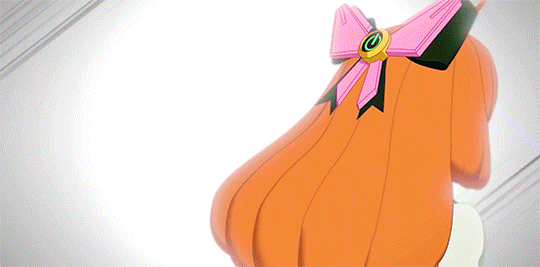
Penny: Let me choose this one thing.
Penny’s arc has always been about self-actualization and escaping objectification.
She was created to be a weapon and everything was decided for her by basically... everyone:
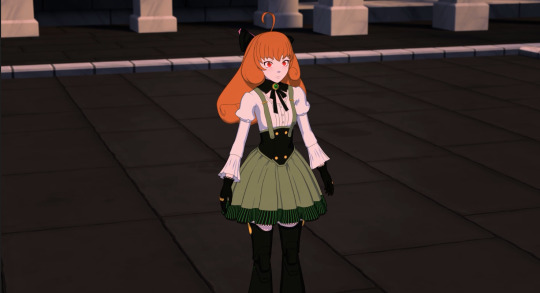

Both enemies and loved ones alike ended up choosing for her multiple times, so it is fitting that Penny herself is the one who has the last word about herself. She makes the final choice that decides how her life should end and what her legacy should be.
At the same time, Penny’s final choice and sacrifice perfectly tie together all the major themes explored in the Atlas arc.
This analysis will try to explore her arc and to show how it is central to everything the Atlas volumes wanted to convey.
PENNY AND HER FAIRIES
What makes a person a person and not something else?
This is a key question in Penny’s story and it can’t be answered without addressing who her Blue Fairy is.
Is it Fria?

Or Ambrosius?
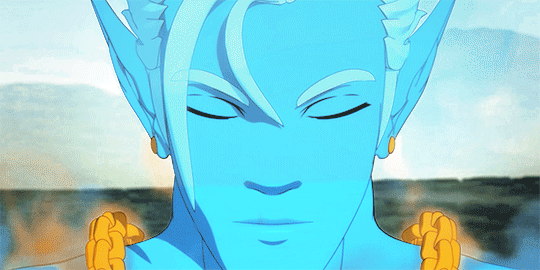
The answer is neither and both. These two characters are definately references to the Blue Fairy, but they are not the ones who make Penny feel human. The one who does is ironically a red fairy:
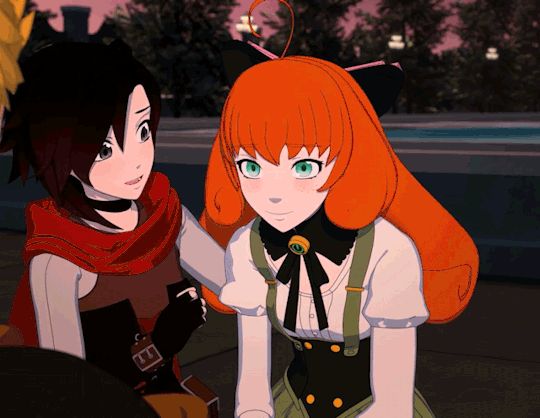
You saw my soul Through the nuts and bolts You're the friend I can trust Helped me see I'm not just a machine
It is Ruby’s aknowledgement of Penny’s personhood that makes Penny feel alive.
So, what about Fria and Ambrosius? What is their role?
Fria chooses Penny as the next Winter Maiden. This is a powerful moment thematically because it is an aknowledgement of Penny’s humanity. She has always been a real girl, a Maiden at Heart, hence she can be given the powers and protect them.
Ambrosius removes Penny’s robotic parts and makes the “real” Penny come to the surface:
Ambrosius: Okay, but if I take the robot parts out of her, that would leave...
Blake: Penny. The girl who's always been there underneath it.
Penny’s new body is human because Penny has always been human and has always wanted to feel human.
In short, these two moments are moments of recognition of Penny’s humanity. She becomes a human both in soul (Fria) and body (Ambrosius). In particular, she has always had a human soul and this is why it can be tied to the power of the Maiden. When it comes to her body, she aquires a human one because her new appearance is nothing, but a mirror of her soul.
Still, even if these two moments are both meaningful, they are also moments where Penny receives something passively. They are aknowledgements of Penny’s humanity yes, but Penny wants more. She wants personhood aka to live as her own person.
To truly become a person one must be able to make their own choices. And interestingly, Penny’s free will is linked to both moments with her two blue fairies.
Ambrosius’s magic does not simply give Penny a human body, but it gives her back her freedom. Not only that, but it makes it impossible hacking her ever again.
Fria’s interaction with Penny is more complicated.
First of all, Fria does not impose the power on Penny, but asks her to make a choice:
Fria: Penny. Are you the one?
Penny: I…
And Penny does so in a sense, but it is gray. Penny is given no time to think about this choice, differently from both Winter and Pyrrha. It is something imposed on her by the events:
Penny: But taking the Maiden power was the only way to stop--
Moreover, it is something she very clearly does not want:
Penny: I was the protector of Mantle, but now, I am much more than that, and I wish I was not.
In short, Penny’s interaction with Fria is a recognition of her humanity, but also a duty imposed on her by external occurrences.
It is not what Penny herself wants. To truly be human, instead, Penny should make her own choices and be given the chance to pursue what she wants.
Still, what does she truly wishes for?
PENNY AND HER JIMINY CRICKETS
Penny’s wish is made obvious since her first appearance:
Penny: "You called me 'friend'! Am I really your friend?"
Ruby: "Uuuum... Y-Yeah, sure! Why not?"
My wish came true That day that you appeared And called me friend
She wants friends to the point that Ruby’s awkward aknowledgement of their friendship is enough to make Penny completely loyal to the other girl.
At the same time, there are many Jimini Crickets that go in the way of Penny’s wish for friendship:
Penny: I've never been to another kingdom before. My father asked me not to venture out too far, but... You have to understand, my father loves me very much; he just worries a lot.
(...)
Penny: I... was asked not to talk to you. Or Weiss. Or Blake. Or Yang. Anybody, really.
Ruby: Was your dad that upset?
Penny: No, it wasn't my father...
Both Ironwood’s high expectations and Pietro’s overprotectiveness make so that she is not free to enjoy her own life as she wants.
She arrives to the point that she comes up with a plan to stay at Beacon with her new friends:
Penny: Ruby, there's something I've been wanting to talk to you about. I want to stay at Beacon.
Ruby: Penny, they'll never let you do that.
Penny: I know, but I have a plan.
However, we never discover what this plan is:

This does not happen by chance and Penny’s plan is not a dropped plot-point. It is symbolic of how her agency is completely negated. She is objectified to the point that her story is interrupted before she can take any action. It is a meta-way to comment her character and her major struggle.
Penny’s first death is more than a murder. It is a way to refuse Penny’s personhood and agency:
Ruby: And Penny… was killed… just to make a statement.
She is used as a symbol of Atlas’s shady research. Penny’s own self is forgotten in the chaos that follows.
The same thing happens in Atlas as well:
Ruby: I don't think Robyn was their target. Salem's goal has always been to divide us. I think Penny was exactly where they wanted her, just like at the Vytal Festival.
This time she is not framed as a victim, but as a perpetrator and used as the symbol of an authoritarian regime.
Her enemies’ objectification of Penny is made clear in many ways:
Cinder: I have come too far to be stopped by some toy!
Cinder: You’re just a tool to be used!
Salem: Although he remains in captivity, it seems that he has worked with Ironwood to gain some control over the puppet masquerading as the Winter Maiden.
And Watts’s virus is just the culmination of it. It is the embodyment of the Jiminy Cricket trying to overwrite what Penny wants.
At the same time, though, Penny’s enemies are not the only ones who try to control her:
Pietro: I lost you before. Are you asking me to go through that again? No. No. I want the chance to watch you live your life.
Penny: But dad… I am trying to.
Penny’s loved ones have tried to protect her all along. However, this wish of protection ends up going in the way of what she really wants:
I've been combat-ready since The day dad made me Now I'll fight for something more Might sound wholesome, But strangely I've got friends Fighting for
What Penny wants is to fight together and for her friends. She does not want her life to be considered less than others’. Still, she does not even want it to be put before others’:
Cinder: I don’t serve anyone. And you wouldn’t either, if you weren't built that way.
Penny: That is not…I choose to fight for people who care about me.
In short, it is as Maria says:
Maria: Don’t you think Penny has had enough people telling her what to do?
PENNY AND BEING A REAL GIRL
At its root, Penny’s struggle has always been this:
Penny: I feel like I wish I could do both the things I need to do and the things I want to do. Is that normal?
She wants to reconcile her duty and her personal wishes.
It is her duty to accept the power of the Maiden and to protect it.
It is her wish to live with her friends and to protect them.
These two things end up coming into conflict multiple times:
Penny: And after the launch, I’ll return to help you all with the evacuation.
Pietro: About that, Penny. When Amity goes up, I think you should be on it with Maria and I.
Penny: But they need me here. Right?
Ruby: Well, if you stay far out of Salem’s reach, then she can’t open the vault. She can’t get to the relic. So...
Weiss: Maybe it is for the best?
Until the finale where Penny makes a specific choice:
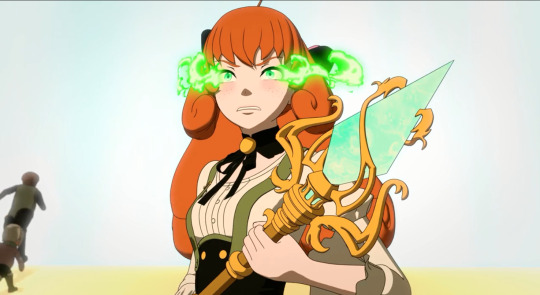
Weiss: Penny, no!
If Penny were to act as the perfect Maiden, she would have just gone to Vacuo with the staff. In this way she could have protected both the relic and the power. Even if Cinder had ended up killing all her friends, Salem would have still lost.
However, Penny decides not to act as a Maiden, but as a friend:
Penny: You wouldn’t know anything about friends.
Even the reason why Cinder manages to mortally wound her is because Penny is worried about Jaune and Weiss and gets distracted for a second:
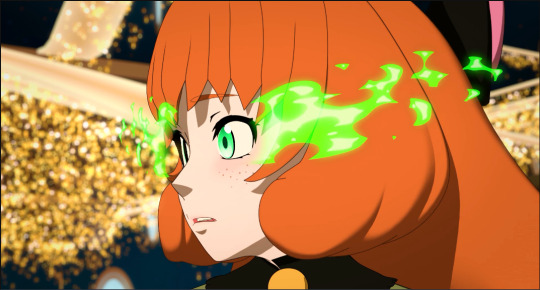
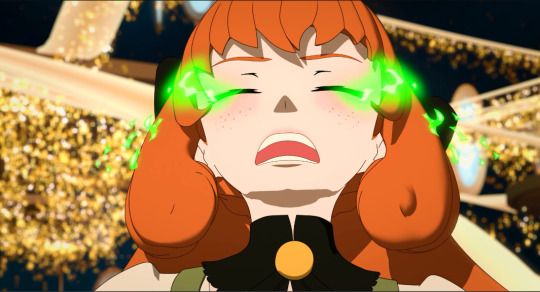
However, it is specifically in the moment of her death that Penny is able to make a choice to reconcile both who she is and what she has to do.
She chooses to protect the power:
Penny: She can’t get the staff..and the power.
And to save a friend:
Penny: I thought of you. And here we are.
Winter would have died without the Maiden powers and the same can be said about the people stranded in Vacuo. Penny saves all by choosing to be the one in control of her death.
Her choice is extremely powerful thematically and it ties together all the themes explored in these last two volumes.
1) It is a choice about trust:
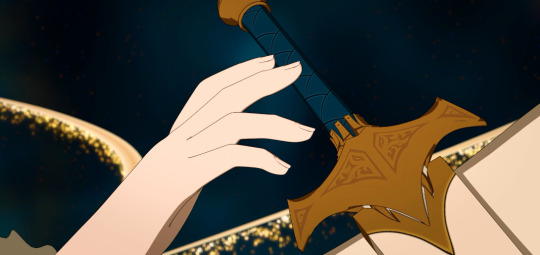
Penny: Trust me.
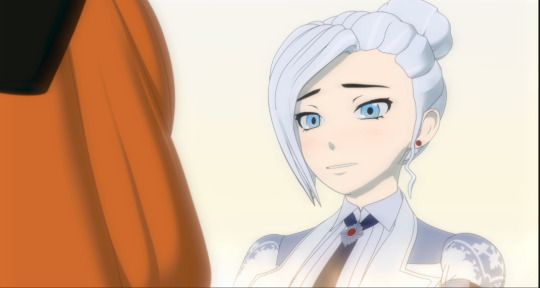
Winter: Thank you for trusting me with this.
Penny asks to be trusted and chooses to trust as well. After all, this is what friendship is all about:
Attached but not By strings
It is a choice that uses the motif of “the part of you” in two different ways.
2) Becoming a part of someone else can be seen as a reference to the process of grieving, which is one of the themes explored in this volume:
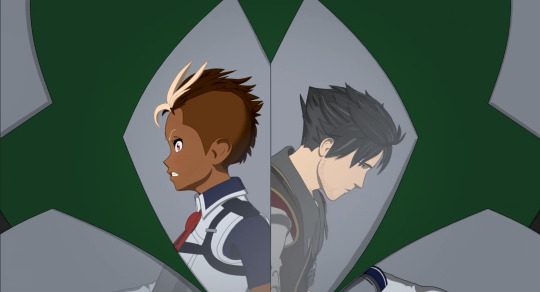
Grieving means to come to terms with your loss, to accept your feelings for the people who are gone and also their contradictions:
Robyn: Clover was a lot of things. You respected him, but I gotta tell ya, I think you’re the better Huntsman.
Vine: Then perhaps Clover was wrong too.
The lost ones will be missed regardless:
Harriet: Don't you dare! Clover was... He was...
Vine: ...Important to you.
Still, once you manage to finally grieve, you’ll realize the other person has become a part of you:
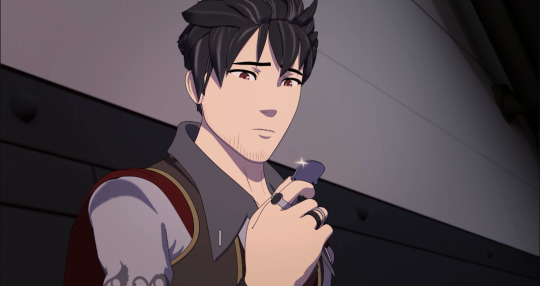
It does not matter if Qrow’s semblance has evolved, if it is a part of Clover’s power having stayed attached to the pin, both or if it is Clover looking out for them.
What’s important is that Clover will keep on living inside Qrow because Qrow will never forget him or what Clover has taught him:
Clover: You shouldn't do that, you know.
Qrow: Don't worry, I-I gave that up.
Clover: I meant deflect a compliment. Those kids wouldn't be where they are without you. You've had more of an effect on them than you realize.
Qrow should love himself. Only in this way he can stop being a self-fulfilling curse. Only in this way he can start looking at his own life with hope and wish for good luck.
Similarly, Penny won’t be forgotten and her legacy will live through Winter:
Penny: She's… gone.
Winter: No. She's a part of you now.
Penny: I won’t be gone, I’ll be part of you.
3) Penny becomes a part of Winter because Winter is finally able to do this:
Winter: But yes Penny, we must still acknowledge our personal feelings, wrestle with them. It ensures us that we're on the right path. It's what makes us human.
Winter is the one who taught Penny this, but it is obvious that through volume 7 and 8 she has avoided to face her feelings for both her family and Ironwood. By the end of volume 8, however, she is finally able to accept her emotions. She can finally follow her heart. Penny becoming “a part of her” is symbolic of this. As a matter of fact their dynamic has always been about Winter acting as “the mind” and Penny being “the heart”.
Symbolically they integrate because they both are becoming their own person even if in different ways.
Winter becomes her own person because she rejects this mentality:
Winter: Penny. The general is making hard choices so we don't have to.
Penny becomes her own person because she is finally in control of herself and her destiny. Moreover, she is able to do for Winter what Ruby has done for her:
Winter: No, Penny, you were always the real Maiden at heart. I was just a machine. Just… following orders.
Penny: You’re my friend.
She affirms Winter’s personhood and in this way she affirms her own as well.
In other words, this version of Pinocchio does not end with the protagonist being transformed into a real boy by the Blue Fairy, but with Penny transforming Winter in the Blue Fairy:

So “becoming fully human” in RWBY means to do this:
Qrow: This last great creation would be given the power to both create and destroy. It would be given the gift of knowledge, so that it could learn about itself and the world around it. And most importantly, it would be given the power to choose, to have free will to take everything it had learned and decide which path to follow - the path of light or the path of darkness. And that is how Humanity came to be.
It is about gaining knowledge, like Penny does about feelings and relationships, loving life and accepting death. Finally, it is about making a choice, even if it is painful.
This is because being human is not always simple. It can be hard:
But I found that humanity It came with sacrifice
Having a human soul means you have a duty to do the right thing out of your own free will, like Fria’s gift showed.
Having a human body means you can experience the warmth of a hug:

But it also means you can be mortally wounded:

This is Ambrosius’s teaching.
Still, it was worth it all for Penny because she got the chance to meet friends and to feel alive:
An answered prayer A chance to Share the world To be a girl Who fin'lly felt alive
This is why her second death can be juxtaposed to her first one. Both times she was killed by Cinder. However, the first time she was used as a pawn in Cinder’s plan. This time instead she is not letting herself be controlled and she negates Cinder what she really wants out of her own free will.
In conclusion, there is this phrase by Jean-Paul Sartre:
Freedom is what you do with what's been done to you.
And I think it sums up Penny’s story perfectly.
Penny does not choose to be born a robot or to be used as a weapon. She is objectified in multiple ways...
Still, she manages to make something amazing out of herself.
515 notes
·
View notes
Text
@sage-striaton replied to your post:
Idk how people can say Frontier has characters that lack depth. Imo it’s a very psychological season. The whole adventure thing is aimed to making them grown in their behaviours and feelings, it’s a big metaphor of their development
I’m sorry for hijacking your response to my post to segue this into another rant of mine, but I want to emphasize that one of my goals with this blog (if I can be said to have any) is that I really, really, really want people to re-examine whether they actually believe in the rhetoric that’s been dominating this fanbase for two decades, or whether there’s more to it. This is especially in regards to the fact that we’re talking a series deliberately written in such a way that it’ll change meaning and nuance as you get older, so it can “grow up” with you in a sense, and yet it seems like -- especially in regards to Adventure through Frontier, due to their position as the oldest series that the majority of the fanbase was elementary or preteen age during -- people are still regurgitating the same rehashed twenty-year-old ideas like they’re undeniable law. It’s one thing if they’re saying it because the series didn’t sit well with them the first time and they don’t want to watch it again, but we’re reaching a recurring problem where it’s sort of “brainwashing” even people who don’t actually believe it but feel compelled to go along with it, or wouldn’t feel that way if it weren’t for peer pressure. Obviously, there are dissenting opinions, and ones that are even very loud about that, but that pressure remains.
The mainstream opinion in the fanbase is that Adventure is untouchable and impervious to any criticism, 02 is its inferior sequel with half-baked characters, Tamers is an auteur work that’s the “deepest” of the original tetralogy due to being dark, and Frontier is devoid of much substance at all. Even those who don’t really believe in this will still be pressured to go alongside it, those who like 02 or Frontier will be pressured to consider it a “guilty pleasure”, and it’s only very recently when certain events revealed that the idea of 02 actually having quite its own fervent and passionate fanbase that likes it on its own merits became properly recognized. (I have actually noticed a huge uptick in 02 fans, especially casual ones, being more shameless in talking about liking it in the last two years; you’re still going to get the obnoxious person “reminding” you how bad it apparently is if you bring it up, but it’s not nearly as prevalent as it used to be.) I’m not talking about whether something is a “good” or “bad” series -- that concept doesn’t really exist to me as much as whether it’s “to one’s tastes” or not, and I think one of the joys of this franchise is that it has things that cater to people with vastly different preferences -- as much as a lot of potential for analysis and intimate thought about these very fascinating series. Even if 02 and Frontier were as shallow or half-baked as they were accused of, I wouldn’t think it’d be shameful to like them for one’s own reasons anyway, but what frustrates me is that I just don’t think that’s true in the first place!!
Not helping is that there’s still a refusal among the fanbase to admit that there were substantial differences in American English dubbing (especially in regards to Adventure and 02), which I don’t mean as a bad thing in the sense that some people prefer to stick only with that dub and consider that version what they want to work with, but in the sense that the treatment of them as “the same thing” has been horribly detrimental when two people, one coming from that dub and one coming from the Japanese version (or a dub more closely based on it), will end up often having an argument doomed to go nowhere because they were never talking about the same thing to begin with. Recently, a friend admitted to me that although they’d switched to the Japanese version a long time ago, they still couldn’t get the image of Daisuke and Takeru having an inherently hostile relationship (they don’t) out of their head due to the influence of that dub, and although they consciously knew better -- at least enough to admit this to me -- it wasn’t helped by the fact that the fanbase itself continues to reinforce this image because of how normalized it is to treat the dub version and the Japanese version as “virtually the same” and for Western fanbase discourse to assume you should be projecting those takes into the Japanese version. If you’re hanging out in English-speaking circles but are working from the Japanese version or a dub directly based off of it, you do actually have to filter out a lot of takes you’re hearing because they won’t actually apply to the version you’re watching, but not a lot of people realize this.
All four of Adventure through Frontier share tons of key staff, especially Seki, known for her focus on wanting the kids in the audience to be able to empathize with and relate to the characters on screen. All four share some of the best character work I’ve seen not only in this franchise, but also in kids’ media in general, and I also stress that a lot of this has a ton of nuance that isn’t always apparent unless you read between the lines. I do understand that a lot of this probably went over our heads as kids, and I won’t say that the choice to execute it this way should be impervious to criticism, but nevertheless, I think it’s important to call attention to the fact it is there, and much of it becomes recognizable once you see it that way; for instance, so much of "it's contradictory character writing!" comes from the fact that the series tries to represent humans in their inconsistent, messy ways, and while it'll feel "messy" from a writing trope perspective, when you think about it as "since this person has this mentality, does it make sense to approach this with this mindset?", suddenly it becomes very consistent. The supposedly “shallow” 02 and Frontier characters will act in ways that match existing psychological profiles meant for actual humans to terrifying degrees, in ways that you might actually recognize even better once you’ve hit adulthood and start intimately understanding things like depression or anxiety in ways you might not have before. Shockingly, “having heart, important themes, and kindness towards the human condition” are completely valid reasons to uplift a creative work in ways distinct from technical writing or cerebrality or how many tropes they subvert or whatever.
On the flip side, people praise Adventure and Tamers for being the naturally “superior” works with better writing, but when it comes to talking about why the writing is supposedly better, a good chunk of the reasons stated don’t actually explain anything substantial, or go back to actually being passive-aggressive dunks on the other series in some form -- it’s because 02 and Frontier’s character writing sucks that badly, or because Adventure had the “best plot” (which may be true if by “best” you mean “easiest to understand”, but that doesn’t mean much to someone who might not be very happy about how its story progression is just a boss rush), or because Tamers is the “deepest” when by “deep” they actually mean “cerebral, dark, and unsubtle about it” without any further meaning (as if Adventure and 02 were idealistic series that never went into anything nuanced and not, say, the fact they went very viciously deep into societal issues between parents and children, psychological horror, and intimate takes on the human condition). I’m personally saying this as someone who does think Adventure and Tamers have a lot to praise in terms of their approaches to realism and the unique aspects each bring to the table, and I feel that people like this are doing them more of a disservice by not bothering to uplift them for any reason that isn’t actually just inherently condescending. I mean, even taking this outside of the original tetralogy for a bit, when I was plugging Appmon earlier, there’s a reason I focused more on its theme and character writing and the use of “dark” writing to convey its sheer range, rather than trying to boil it down to a shallow “it looks cheery but gets really messed up later!”, which is unfortunately an argument I’ve been seeing about it lately.
In the end, when I write my meta, I write it "making a case" for my point of view, and I welcome others to disagree, but if you disagree, I really hope it'll be because you personally disagree, and not because the entire fanbase has been saying otherwise for twenty years and I sound like a radical. I’m not saying that everyone’s consensus takes are completely unfounded, but frankly speaking, this fanbase has some really bad takes, and in the past few years I’ve found it freeing to not only “say what you feel without worrying what others think”, but actually go out of my way to outright try and purge all the preconceived notions and pick only the ones I agree with because I actually agree with them. I encourage you to do it too! And if you do, you might find things about something you like that you didn’t realize before.
#digimon#shiha's ask box#sage-striaton#digimon adventure#digimon adventure 02#digimon tamers#digimon frontier#shihameta
73 notes
·
View notes
Text
MHA prediction on how Shigaraki’s story might end (and some thoughts on Eri’s quirk)
What we know…
His whole thing as a child was he “never heard what he needed to hear” (presumably that he could be a hero)
There’s an overwhelming theme of holding out a hand to someone you wish to save
AFO is able to… control(?) Shigaraki’s body because of his hate/anger
Deku wants to save Shigaraki next time they meet (sorry if YOU don’t like the villains, this is literally something Deku has said he wanted to do)
Extreme acts of violence did not defeat ShigarAFO and led to Star’s (supposed) defeat (in some form or another)
A big theme Shigaraki likes to bring up is that “violence breeds more violence”
Eri’s quirk seems to have a lot of uses and can be specified to rewinding certain aspects of a person (which I will talk about below)
Based on all this, here’s my prediction: when Deku finally confronts Shigaraki they will have some sort of fight (because this is a shonen series) that will span a few chapters. Deku is very smart and will probably realize that fighting is pointless and, at this point, he is so outmatched that it isn’t a question of who would win in a physical fight. At the end of it, rather than end with a massive attack, it will end with Deku reaching a hand out to Shigaraki and screaming to him that “he too can become a hero” (the same lines All Might said to him way back in chapter 1)
While this won’t instantly end the fight, the Tenko part of his mind will become so overwhelmed with a sense of joy/calmness that AFO will be physically unable to keep his hold over him. This could give Deku enough time to restrain him and get him to a place that can help (possibly to Eri, who could undo the procedure and get AFO (both the quirk and the guy) out of Shigaraki’s mind).
Of course, lots could happen during this fight and plenty could happen afterwards, so I’m not going to harp on that for too long. That’s my main theory, regardless of the smaller details. Anyways, a quick analysis of Eri…
Eri Quirk Explanation:
Eri’s quirk is weird in that we never get a full breakdown of how it works. We know that she can rewind people, and in its most basic, untrained form, she will simply wipe someone out of existence (presumably because she is rewinding their age). However, from context clues, I think that she is able to specifically target certain aspects of a person that she wants to rewind
Overhaul’s line of “use it right and you could turn someone into a monkey” seems really weird until you consider the way the bullets work. The bullets “rewind the person to a point where the species didn’t have quirks” meaning Eri could (in theory) target someone’s genes rather than their basic body.
While we haven’t seen a ton of Mirio since his return, it didn’t seem like he lost any of his memories (he seems to remember Sir Nighteye’s final words), meaning she may have targeted his quirk genes specifically OR rewound him in such a way that he didn’t not suffer memory loss. This means that she could technically rewind Shigaraki in a way that undoes the AFO procedure without erasing his memories/characterization.
Just some thoughts, maybe it’s just wishful thinking. It’s way too early and I’m kind of sleepy.
#bnha#mha spoilers#bnha spoilers#bnha meta#bnha prediction#tomura shigaraki#izuku midoriya#tenko shimura#if I get this right I am never going to shut up
37 notes
·
View notes
Text
ok i want to talk about the symbolism in here bc even though its one of my simpler pieces i put at least a little bit of thought in2 it !!
so the main focus is a math concept, it's a graph of an asymptotic function. the idea behind asymptotic lines is that they approach a specific number/value but will never reach it; ergo, they will be constantly moving towards something but it will infinitely be out of reach. so with this piece there is the theme of distance, both between the two halves of the function (red and blue lines) and between each half of the function and the asymptotes (not pictured). the graph background i've drawn relates to mirage's distance from everything in life as well as her struggle to find a purpose in life. she may approach finding hope (approaching the asymptote), but ultimately she is barred from reaching it due to her nihilism. similarly, she is distanced (separated, as the function is divided by the asymptote) from both her own desires and the things in her life such as school. the asymptotic function represents the (self-made) barrier between mirage and the rest of the world.
secondly the stationery & school supplies. i often think about how mirage is a schoolgirl and has to deal with the stresses of being in class, having homework, having to navigate a social life at school, and how draining it must be for a girl who's already so tired of everything. so i imagine that school must already be a huge struggle, and that's why she has to rationalize it as not mattering. nothing matters, so school doesn't matter, so it doesn't matter if she fails in all her classes. but analysis of mirage aside, i use the red pens in this image (seen in the top left, top right, and bottom left corners) to emphasize mirage's struggles in life. red pens are known for being used to mark mistakes, errors, and other things being done wrong on a student's work. so by having red pens be literally connected to mirage and physically surrounding her, i attempt to convey her lowered self-worth. mirage viewing all of human intelligence as a mistake implies that she also believes this about herself - *she* is a mistake. so the red pens are only fitting. also i like drawing pens and pencils because i am objectum 🫶
speaking of mirage herself, i'm pretty proud of the way i've drawn her here. she's got her tie undone, her sleeves rolled up, she's sitting in a not-exactly-ladylike position and i wanted to make her feel more casual or even more vulnerable. i haven't drawn her lens/eye/light source/whatever you call it half out of convenience and half because i wanted the artwork to continue feeling hazy and abstract and impersonal. i like the dichotomy between the small details of mirage's arm and the denial of giving her an "eye" or a "face". can't quite put it into words but that feels similar to how mirage attempts to be vulnerable with the player character but still feels incredibly distant.
not too much to say about the grouped-up objects in the fourth quadrant (lower right). did you know the paper is in morse code? i considered putting more code on her notebook and notecards as well, but i felt as though that would make the piece more cluttered and it would lose its dreamy air (the separation of colours helps with this a lot). i would've also marked up mirage's writing with red pen to emphasize her percieved "failure" in life but i realized that would make the morse code much harder to see. so thats it really 👍 i like talking about my own art & its very fun to think about mirage

asymptotic - infinite distance (part of an art trade with @b1ttersweet-dreams !!)
259 notes
·
View notes
Note
Hello!
So I’m the anon who asked for more Archon War Venti headcanons and I just loved it! I really like reading your headcanons cuz some of them are similar to mine but mostly are headcanons that I didn’t think of so it really is nice to read and see your thoughts about Venti!
I feel like as if I’m asking too much but could you keep doing these types of headcanons? Like it doesn’t have to be Archon War headcanons but like some headcanons about Venti’s relationship with the Ragnvindrs and Gunnhildrs. Because the first Gunnhildr was the first one who prayed to Barbatos and the first Ragnvindr was his friend who left but came back and I really wanna hear your thoughts on that!
And I’ve decided to get off anon cuz you just replied to my texts and I wasn’t expecting that so I’ve got a short confidence boost that I am completely taking advantage of! And thanks for the advice! or uhh comment? observation? I’m not entirely sure but thank you for that! I’ve heard that be said to me a few times and I have been trying to be more, uhh, assertive so thanks for that!
rfouierjkhfkecs i actually came across information on Gunnhildr and the "Red-haired warrior" yesterday when i was doing more research into the rebellion against Decarabian and I was like "wow this would be really fucking fun to research and theorize on, but its too specific/niche to include unprompted no matter how much i want to" but bestie you prompted, and im literally so happy right now because I didn't think I'd ever really get the chance to post about them!
also lmao yeah, i tend to try and reply to as much as I can, since it's a good feeling when someone does and all. but yeah, no problem! I’m glad you felt confident enough to reveal XD.
This may be structured a bit more like analysis/theory/just citing canon things at first before it gets into a more headcanony format.
ehe i have so much free reign on this it's lovely
More Archon War Era Venti: one two three
spoilers for Venti's backstory and Diluc's(kinda, i think, just in case)
first things first, laying down some canon background because before yesterday i hadn't heard of either of them outside of that one cutscene.
the very reason Decarabian had his storm wall up in the first place was because at the time Andrius had declared war on him- and his tower, and the city of Mondstadt by extent, were basically constantly under attack by Andrius's blizzards, which since he was still alive back then, were a lot bigger and covered basically what seems to be the whole of Mondstadt outside the barrier.
This meant that people had two options. Live in the city under Decarabian's oppression, or live outside the barrier, and brave the blizzards of a warring god... which was not a good idea
but the Gunnhildr clan(not yet called that) tried- and they almost died because of it. In the midst of a blizzard, the clan chief's daughter, named Gunnhildr(which the clan would be named after later) sent out a prayer that was heard by a wandering wind spirit. And the faith of that prayer gave the spirit enough power to create a small shelter to protect them.
When her father past, she became the new leader and also a priestess. She would later lead the clan to fight Decarabian alongside four others. And basically the Gunnhildr Clan ended up as like sworn protectors of Mondstadt
-
as for the red-haired warrior, who is basically assumed to be the earliest known ancestor of the Ragnvindir clan(im gonna refer to as Ragnvindir for convenience sake, even though "Ragnvindir" is technically a different character from Vanessa's era)theres not much information on him, but heres what i have from the various wiki's
- he was a wanderer
- one of the first to use the sign of windblume to find other rebels(so he's intelligent)
- actively propped up the nameless bard so he could watch as the tower was destroyed
there's this little tidbit too from the Windblume Ode bow's description that im probably gonna talk about a considerable amount too: "Atop the ruins of the ancient tower, amidst the cheers, songs, and tears of those who had newly won their freedom. A red-haired warrior turned his back on the newborn god, hidden like a single raindrop in a tidal wave of humanity. He was first among those who passed the secret sign of Windblume, the one who wove threads of dawn throughout the long night. His name has since been lost to time, but his deeds are still remembered in song." followed later by "The fate of this clan will likely never change: they shall ever live in the darkness and bring forth the flame of dawn."
-
Now I'm going to start with the Ragnvindir(geez, why's it spelled like that tho)
My idea of his character is basically formed by a mix of Ragnvindir stereotypes and just generally analyzing text.
So what do we know about Ragnvindir's for sure? they are shady motherfuckers- or at least they rarely operate in the spotlight. also damn, these guys are more cursed than anemo vision wielders- like the only one who didn't canonically lose someone close to them was Crepus, but considering that Diluc doesn't exactly have a mom..... he probably did
so what do we know? - he was close with the nameless bard - he was intelligent - he likely operated primarily from the shadows "ever living in the darkness" - he was a wanderer - he abandoned Venti during the celebration - but his deeds were still remembered in song, so Venti and him were likely still close
now the question of the century: how will i choose to interpret "turned his back on the newborn god"? And honestly, I'm- not sure- at first i assumed he abandoned him completely- but Venti did still make sure to carry on his memory- which could just be Venti being Venti, but for the sake of sanity, this is how I'm interpreting it.
A lot of things happened to the Ragnvindir that day. He lost a friend, saw another become a god to replace the one they had conquered, and he saw his goal, his reason for being in Mondstadt, come to fruition. "see the world through my eyes" the bard had said, and the Ragnvindir had been a wanderer even before. Sure, the people had won freedom, and that was to be celebrated, but he's intelligent to recognize that people would likely see him as one of the key figures in leading the rebellion. And for him this was a solemn time, and ending to a chapter, and not being one to operate in the spotlight, the last thing he'd want is to be swept up in festivities and attention at a time like this.
It also likely didn't help that he's probably smart enough to understand the idea of "power corrupts," and seeing the wind sprite just readily accept the mantle of Archon was likely not the most comforting thing to happen in the given situation after all. But Decarabian was gone, and Andrius had ceased his blizzards, so without a word, he slipped into the crowd and left, a wanderer once more.
-
now back to Gunnhildr
she was the first to receive an anemo vision from Barbatos, no I do not take criticism on this "the power bestowed on her by Barbatos" like please, they basically said it.
It also mentions that she crowned Venti with laurels(symbol of vistory) after the battle- the book Biography of Gunnhildr additionally says "the Gunnhildr Clan will continue honoring the legacy of its ancestors and its duty to the Anemo Archon: to protect Mondstadt, the land and all who inhabit it, forever."
I really like this because it conveniently ties into my past headcanon about Venti granting visions to the people of Mondstadt and having them be the ones to erect wind barriers and defend the city in his absence.
So in the Archon War I like to imagine that the Gunnhildr clan had a lot of people who were actually granted visions and were basically in charge of protecting it from those who would attempt to ambush them.
Mondstadt essentially became known for this- the fact that the mortals within it were strong enough to fend off the force of a god without support from their own.
but regardless, Gunnhildr, as she had before, served as a priestess to Barbatos, the closest thing that Mondstadt had to a ruler, and yet she only took charge of prayer and protection.... i hate to just- equate them to their descendants- but to an extent- her role was kind of like a merge between Jean and Barbara- Except with a whole lot less structure.... i really dont want their characters to just be carbon copies of the descendants but- c'mon, the comparison was right there.
anyways besties- back to Venti so i can tie them in
The Archon War was one of the worst times for Venti in his entire life thus far. And the time immediately after Decarbian's fall, while Gunnhildr and the Ragnvindir were still alive, was the key period of time in which things could have gone very differently.
Venti is the god of freedom. That's a reoccurring theme and I think I've made that abundantly clear. But during this time, Venti was anything but free.
I've mentioned before how he would stay far from the city of Mondstadt so the shockwave of his death wouldn't reach him, should he fall.... well- Venti is new to a lot of things- godhood- humanity- war- freedom- and at this point he was trying hard to figure out how to be Mondstadt's god without becoming Decarabian, and while still being able to survive, and make sure they survived, and see the world for his friend, and carry on his friends legacy.
And this is a lot of stuff for what was once a carefree elemental being, and there were certain things that had to be done for this to happen. He couldn't just stay in Mondstadt, or he would grow weak and his people would be vulnerable to attack, but he couldn't abandon it, because despite being able to fend for themselves, there's always hat just in case. He couldn't stay in any one place outside of Mondstadt for very long or he'd be found and killed. He knew in order for Mondstadt to survive he would have to take an active role in the war, strengthen himself so he could defend Mondstadt, and thats exactly what he did.
He started by going after the less powerful gods, ones he had a chance at beating with the power he got from the Gunnhildr clan and the rest of Mond, and by wiping them out, he would grow stronger, so he kept it up- working his way up the metaphorical ladder.
but he couldn't let anyone near him either, because he knew just what would happen if he was attacked then. Were it not for Gunnhildr's prayer, the early years of the Archon War would have been without contest the loneliest time of his life, and there would be nothing he could do about it, bound by survival and his attachment to the legacy of his friend, constantly fearing for his life and going against his very nature as the god of freedom. Frankly thrust into that circumstance that early on, and having to face it alone, it's likely that Venti would have caved under the pressure and dropped his attachment to either his survival, or to his friends legacy... or just something entirely worse(isolation messes with brains) so I'm attributing the fact that he didn't do that to Gunnhildr's companionship, speaking to him and guiding him through it as he had guided her through the blizzard some time ago.
I also like to think that she's responsible for founding at least a number of the different celebrations that still happen in Mondstadt even now.
Ugh supportive warrior priestess- we stan
anyway meanwhile! we got the Ragnvindir
He hears about Venti taking part in the Archon war during his wanderings and returns to Mondstadt to check in, wary of what he might find.
Venti, who hadn't seen him since the rebellion, is elated to say the least and they do a bit of catching up because they need it
and then the conversation turns more serious, and the Ragnvindir brings up a third thing that Venti needs to hold onto- his humanity.
See, in the early years, just desperate to get a foothold on the world, Venti's first number of targets were just indiscriminately going after those he knew to be weaker than him, and the Ragnvindir points this out, saying that while it's not necessarily bad, if he keeps doing it, it won't be long until he causes his and, by extent, Mondstadt's legacy to be tainted by a reputation for slaughter, no better than any of the other bloodthirsty gods that frequented the war's fields. "Think of what the bard would do, we were both close enough to do that much"
And Venti becomes yet more caged, but recognizes that he's right, and this is another turning point, that in the coming years would keep Venti from losing himself.
also- Gunnhildr, Venti having told her about the Ragnvindir's concerns that he now shared, probably organized some kind of event (not unlike the right of part, but also, yes unlike it) that was deliberately intended and designs to serve as an excuse that Venti could chose to take to visit Mondstadt, something she know he desperately wanted to do, but wouldn't allow himself for fear of putting them in danger. But if she made it an official celebration, then it would give Venti the opportunity to visit his people again, under the guise of it being a responsibility, not having to deal with the moral implications of doing so at a time when he was already dealing with enough of those already.
Also on his travels, the Ragnvindir probably started and spread a number of rumors that could end up working in Venti's favor, not that anyone ever knew it was him of course.
basically Gunnhildr protected the people of Mondstadt and did all she could to keep everyone in as high spirits as possible, Venti included.
And as for the Ragnvindir, he took a more realistic approach, traveling and getting venti followers in far places, spreading false information about him, and just overall making sure that Venti didn't do things he'd regret.
And when they died, Venti would carry their legacy with him as well, not losing his humanity to the tide of war as he very nearly had(though he still often came close), and trying to spreading high spirits where ever he could without fail.
#genshin impact#genshin venti#genshin impact headcanons#genshin theory#genshin headcanons#archon war era venti#genshin barbatos#genshin decarabian#nameless bard#genshin ragnvindir#genshin gunnhildr#genshin lore#genshin spoilers#spoilers#angst#venti angst#archon war#old mondstadt
114 notes
·
View notes